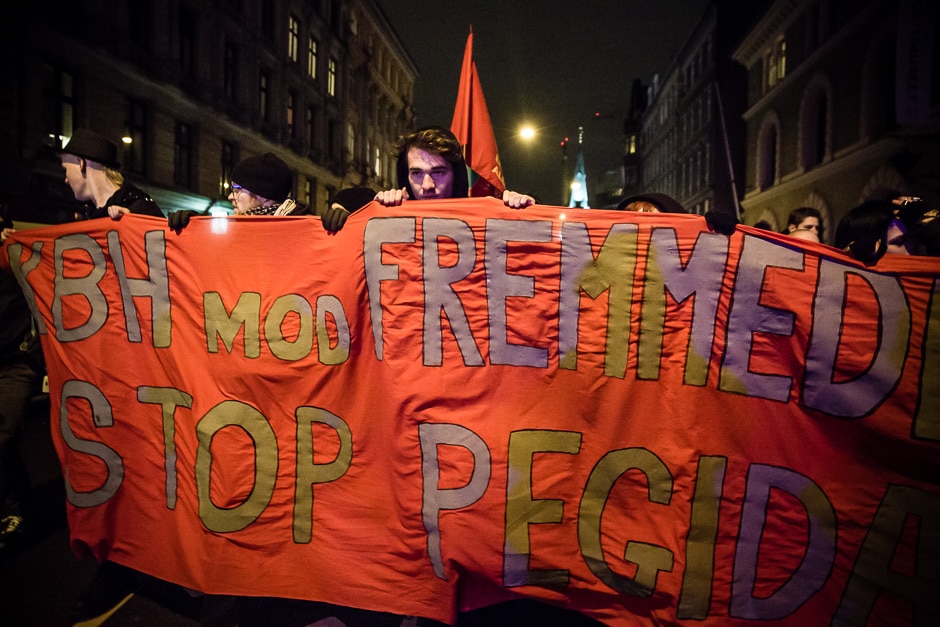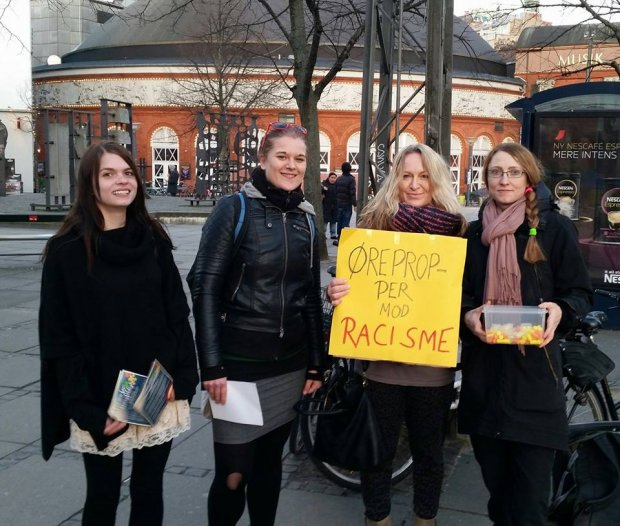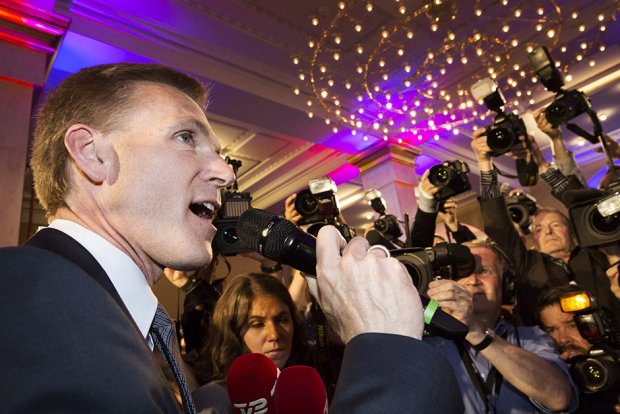
Socialistisk Biblioteks Tidslinje med links til begivenheder og personer i 2015.
Se også Index over personer, organisationer/partier og værker (som bøger, malerier, mm.), steder, begivenheder, mv., der er omtalt på hele Tidslinjen, titler og indhold på emnelisterne osv.
Året 2015
Se:
- The 2015 Jacobin Mixtape: A year of smooth jazz and revolutionary exhortations (Jacobin: Reason in Revolt, 31 December 2015)
- Best films of 2015 (World Socialist Web Site, 31 December 2015)
- The year in popular music (World Socialist Web Site, 30 December 2015)
- 10 good things about the not-so-great year 2015 (CounterPunch, December 24, 2015)
- Resistance in a year of fear (SocialistWorker.org, December 18, 2015)
- The year in female protagonists (SocialistWorker.org, December 14, 2015). “… some great high points of the year in movies and TV.”
- Predictions for 2015 (Michael Roberts Blog: blogging from a marxist economist, December 30, 2014). Predictions about the world economy 2015.
5. januar 2015
Først danske forsøg på at gennemføre en dansk anti-muslimsk og anti-indvandrer Pegida-demonstration i Haderslev bliver mødt med langt større moddemonstration.
Organiseret af yderste højrekræfter forsøger Pegida at gennemføre manifestation flere steder i landet. I København bliver det anledning til en række faste mandags-demoer “for mangfoldighed”, og debat om Pegida-talspersonen Nicolai Sennels’ faglige etik og ansættelse, bl.a. på Modkraft blogs (se links nedenfor).
Se:
For og imod Pegida (19. januar 2015-demoer). Fotoserie af Mette Kramer Kristensen/Monsun. (Modkraft, 20. januar 2015.)
Leksikale/Sites:
- Pegida-artikler på Wikipedia på tysk og på engelsk.
- Redox.dk: Emneordet Pegida
- Modkraft.dk: Nyheder og kommentarer under emneordet Pegida, kronologisk liste, nyeste først.
Artikler:
Fortsat aktuel: Pegida – et mindre fænomen med potentiel stor betydning. Af Willy Buschak (Kritisk Debat, 15. april 2015)
Fænomenet Pegida: Succes, splittelse og afmatning. Af Anne Jessen (Modkraft/Kontradoxa, 20. februar 2015). Oversigtsartikel.
Massivt nazifremmøde ved Pegida-demonstration (Redox.dk, 20. januar 2015)
Store protester imod antimuslimer over hele landet. Af Rune Eltard-Sørensen (Modkraft.dk, 20. januar 2015). Med links.
Danske højreradikale kopierer antimuslimske mandagsmarcher (Redox.dk, 9. januar 2015). Se også: Truslen fra højre: Årsrapport 2014 (pdf) (Redox.dk, marts 2015, 30 sider)

(Foto: Højtråbende antiracister konfronterede Pegida i København (Modkraft.dk)
Modkraft/Blogs:
Louise Pedersen: Find et andet job, Hr. Pegida (5. februar 2015). Med debat.
Jan Hoby: Er Professionel Etik & racisme, antisemitisme, islamofobi uforenelig? (27. februar 2015). Med debat.
In English:
Austria: Pegida dealt humiliating blow by Marxist led counter-protest. By Florian Keller (In Defence of Marxism, 26 March 2015). “The following is a report of the counter-demonstration.”
The ugly threat to Muslims in Germany. By Axel Fair-Schulz and Laura Fair-Schulz (SocialistWorker.org, March 9, 2015). “Despite its recent setbacks, the successes of the Islamophobic PEGIDA movement have identified fertile ground for the far right.”
Stopping the German far right (Socialist Review, Issue 400, March 2015). “Socialist MP Christine Buchholz outlines the tasks and the challenges for the anti-fascist and anti-racist movement in Germany.”
Pegida – an ultra-reactionary, Islamophobic and racist movement. By Manuel Kellner (International Viewpoint, Issue 481, February 2015)
Resisting the right’s racist rallies in Germany. By Nora Berneis and Max Manzey (SocialistWorker.org, January 12, 2015). Nora Berneis and Max Manzey are members Marx21, a network of revolutionaries within Die Linke.
Se også:
- Indvandrerfjendtlig polemik og propaganda: Nicolai Sennels. Af Rune Engelbreth Larsen (Humanisme.dk)
- Nicolai Sennels – antimuslimsk manipulation. Af Rune Engelbreth Larsen (Humanisme.dk, marts 2009). Anmeldelse af Nicolai Sennels: Blandt kriminelle muslimer: en psykologs erfaringer fra Købvenhavns Kommune (Trykkefrihedsselskabets Bibliotek, 2009, 159 sider)
- Manden med mange ansigter. Af Benny Lihme (Social Kritik, nr.128, december 2011, s.16-23). “Nicolai Sennels er en mand med mange egenskaber, psykolog, buddhist, hjemmeværnsmand, læserbrevsskribent og folketingskandidat for Dansk Folkeparti.” Artiklen er p.t. ikke online.
- Under dække! Af Benny Lihme (Social Kritik, nr.121, marts 2010, s.82-88). Anmeldelse af Nicolai Sennels: Blandt kriminelle muslimer: en psykologs erfaringer fra Københavns Kommune (Trykkefrihedsselskabets Bibliotek, 2009, 159 sider). Artiklen er p.t. ikke online.
7. januar 2015
I Paris bliver det satiriske magasin Chalie Hebdo udsat for angreb, der koster 12 mennesker livet.
Bland de myrdede var tegneren Georges Wolinski, der har fået udgivet flere serier på dansk. (se Wikipedia artikel)
Charlie Hebdo havde i januar 2006 egne satiriske tegninger, sammen med Jyllands-Postens tegninger fra september 2005 (se linkbox om Muhammed-tegningerne og debatten).

Leksika/Encyclopedias:
- Charlie Hebdo shooting (Wikipedia.org)
- Charlie Hebdo (Wikipedia.org). Med link til dansk artikel.
Modkraft nyhedsartikler:
- Mindedemonstration uden Front National-deltagelse. Af Ole Wugge Christiansen (12. januar 2015)
- Charlie Hebdo skaber debat: Kammerater eller islamofober? Af Rune Eltard-Sørensen (9. januar 2015). Med en del links.
- Sådan reagerer venstrefløjen på terrorangreb i Frankrig. Af Rune Eltard-Sørensen (7. januar 2015). Med en del links.
Modkraft blogs mv.:
- Venstrefløjens overbalance: Fra kapitalismekritik til islamkritik. Af Jan Hoby (Modkraft.dk/Blog, 20. januar 2015). Med efterfølgende debat.
- Højreradikalismen er vinder. Af Curt Sørensen (Blog, 15. januar 2015). Med efterfølgende debat.
- Er vi virkelig alle Charlie? Af Bue Rübner Hansen og Yannick Harrison (Kontradoxa, 15. januar 2015). Med efterfølgende debat.
- Tanker efter massakren i Paris. Af Pelle Dragsted (Blog, 14. januar 2015). Med efterfølgende debat.
- Racialiseret sekularisme = vor tids racisme! Af Jan Hoby (Blog, 11. januar 2015). Med efterfølgende debat.
- Hvorfor SKAL man forsvare retten til hån, spot og latterliggørelse? Af Anna Rytter (Blog, 9. januar 2015). Med efterfølgende debat. Se også Anna Rytter: Har vi glemt, hvad racisme egentlig er? (14. januar).
- Angrebet på Charlie Hebdo er en politisk forbrydelse. Af Christian Juhl (Kontradoxa, 13. januar 2015). Tale holdt ved demonstration på Sankt Hans Torv i København, 11. januar 2015.
- Kan man forsvare ytringsfriheden uden at forsvare racistiske tegninger? Af Bue Rübner Hansen (Kontradoxa, 9. januar 2015). Med efterfølgende debat.
- Aftenlandets Undergang? Af Curt Sørensen (Blog, 8. januar 2015). Med efterfølgende debat.
Andre artikler:
’Venstrefløjens islam-forsvarere er også racister’. Af Sebastian Kjeldtoft (Information.dk, 7. januar 2016). “Chefredaktør Stéphane Charbonnier havde netop færdiggjort sit manifest for ytringsfriheden, da han blev dræbt i terrorangrebet.”
Frankrig efter Charlie Hebdo-angrebet. Af Denis Godard (Socialistisk Arbejderavis, 14. februar 2015). “Det umiddelbare svar efter angrebet på Charlie Hebdo var ‘national enhed’ imod terrorismen.”
Efter Charlie Hebdo-attentatet. Af SAPs forrretningsudvalg (Socialistisk Information, 26. januar 2015). “Er det udtryk for et holdningsmæssigt, måske endda opportunistisk skred, når f.eks. Enhedslisten i sagen om Charlie Hebdo er fuldstændig frådende og uforbeholden i sin fordømmelse af attentatet? …”
Jeg er bare en muslim. Af Bent Gravesen (Kritisk Debat, 19. januar 2015). “Det afgørende mål var at erobre ham, der bare vil være muslim, for den politiske islamismes gudsrige.”
Vänsterpress om terroristattacken mot Charlie Hebdo – januari 2015 (pdf) (Marxistarkiv.se, 15. januar 2015). 7 svenske venstrefløjstidsskrifters reaktioner på terrorangrebet.
Al-Qaeda ønsker sig masseovergreb på muslimer. Af Juan Cole (Information.dk, 15. januar 2015). “Terroristernes strategiske mål er at fremprovokere overgreb på Europas muslimer …”
Islamister vakler i troen. Af Slavoj Zizek (Information.dk, 14. januar 2015). “… den eneste måde at besejre fundamentalismen på, [er] at fjerne grunden under dens fødder.”
Hvem sagde Charlie? Af Anna Cornelia Ploug (Kronik i Politiken, 14. januar 2015). “… den massive manifestation [er] bare med til at grave de grøfter som findes endnu dybere.”
Nej, vi er ikke alle Charlie – og det er netop problemet. Af Cas Mudde (Information.dk, 9. januar 2015. Oversat artikel fra Open Democracy.
Partilederdebatten om attentatet på Charlie Hebdo (Jan Øberg, 9. januar 2015). Med link til video fra DR’s partilederdebat 8. januar.
Mørkets kræfter. Af Freja Wedensborg (Arbejderen.dk, 7. januar 2015). “Reaktionære kræfter står på spring for at bruge det forfærdelige angreb på Charlie Hebdo … I november mødtes jeg med tegneren Tignous på Dansk Journalistforbunds Fagfestival.”

In English:
The truth about Charlie: One year after the 7 January attacks. By Karima Bennoune (New Politics, January 8, 2016). ” In case anyone is confused about the politics of this – it was a far right attack on the left.”
Who is Charlie? By Lindsey German (Counterfire, November 12, 2015). Review of Emmanuel Todd, Who is Charlie? Xenophobia and the new middle class (Polity Press 2015, 211 p.)
Socialism, satire and Charlie Hebdo (International Socialism, Issue 147, Summer 2015, p.165-177). “Mark Brown demolishes the defences of Charlie Hebdo’s Islamophofic cartoons as legitimate satire.”
After the attacks on Charlie Hebdo and the Hyper Cacher Jewish supermarket: thinking through the new and rethinking the old. By Pierre Rousset (Europe Solidaire Sans Frontierés, 11 February 2015)
Paris attacks on Charlie Hebdo and a kosher supermarket: What caused the killings? (Europe Solidaire Sans Frontierés, 25 January 2015). Interview with Gilbert Achcar.
Statement of the International Socialist Tendency on the Paris shootings (Internationalsocialists.org, January 22, 2015)
Noam Chomsky slams West’s Charlie Hebdo outrage: ‘Many journalists were killed by Israel in Gaza too’ (Alternet, January 19, 2015; online at Internet Archive)
15 recommended articles on the aftermath of the Paris attacks. By Alex Snowdon (Counterfire, January 17, 2015)
Qui est Charlie? (Weekly Worker, Issue 1041, 15 January 2015). “Paul Demarty asks, who exactly is Charlie?” See also in the same issue Peter Manson: Confusion abounds: How has the left reacted to the Paris slaughter? + Yassamine Mather: Courtesy of the CIA: Did outrage caused by the provocations of an irreverent magazine provoke the Paris attacks?
Samir Amin on the Charlie Hebdo murders: Imperialism and international terrorism (MR Online, 15 January 2015). “France has an extra responsibility: having supported the Islamists in Algeria …”
The issues after Charlie Hebdo. By Yves Coleman (Solidarity, Issue 349, 14 January 2015). “… [about] some of the problems and discussions inside the radical left and anarchist circles.”
Charlie Hebdo – Unity in condemnation and solidarity. By Nick Wrack (The Project: A Socialist Journal, January 13, 2015; online at Internet Archive). “Charlie Hebdo … attacked all religions, exposing their irrationality and hypocrisy. It was irreverent, ribald, scatological and childish. But it was of the left.”
After horror of Paris attacks: say no to racist backlash (Socialist Worker, Issue 2436, 13 January 2015). Theme with 11 articles.
The racist backlash against France’s Muslims. By Elizabeth Schulte (SocialistWorker.org, January 12, 2015). See also Topic: France.
The massacre at Charlie Hebdo. By David Finkel (New Politics, January 9, 2015). “… at the hands of an extremist faction that seeks, first and foremost, to control the lives and the thoughts of Muslim communities …”
Charlie Hebdo tragedy: putting free speech in context. By Des Freedman (Counterfire, January 9, 2015). “This wasn’t an attack on humour or the Western concept of freedom but an outrage designed to produce a reaction of division and hatred …”
Reflections on the events in France. By Alan Woods (In Defence of Marxism, January 2015)
NPA statements on Charlie Hebdo killings (New Politics, January 9, 2015). Two statements issued by the New Anti-Capitalist Party (NPA) of France.
Charlie Hebdo: “There is no way they will make us put down our pens.” By Karima Bennoune (OpenDemocracy, 8 January 2015)
“A Clash of Barbarisms”: After Paris attack, how U.S. policy in Middle East helps fuel extremism (Democracy Now!, January 8, 2015). Interview with Gilbert Achcar (video + transcript).
Don’t let this horror be used to stoke bigotry (SocialistWorker.org, January 8, 2015). Statement of the International Socialist Organization, followed by three statements and articles by organizations of the European left.
Je suis Charlie? It’s a bit late. By Kenan Malik (Pandaemonium, January 8, 2015). “To ridicule religion and to defend free expression is not to attack minority communities.”
The bitter fruits of racism and imperialism (RS21: Revolutionary Socialism in the 21st Century, January 8, 2015). With debate.
Socialist Workers Party statement on Paris killings. By SWP Central Committee (Socialist Worker, Issue 2435, 8 January 2015)
On Charlie Hebdo. By Richard Seymour (Jacobin: Reason in Revolt, January 7, 2015). “The murder of Charlie Hebdo journalists is appalling. But we should fear the coming Islamophobic backlash.” The article with debate at Lenin’s Tomb.

Charlie Hebdo attack: The Prophet Muhammad Cartoons that may have caused Paris Magazine massacre (International Business Times, January 7, 2015)
Se også / See also:
Charlie Hebdos tegninger med engelsk oversættelse (YouTube, 4 min.)
Selv hans streg var et autoritetsopgør. Af Anita Brask Rasmussen (Information.dk, 9. januar 2015). I slutningen af 1970’erne og begyndelsen af 1980’erne udgav det lille forlag Københavns Bogforlag Wolinskis tegneseriealbums på dansk.
Demokrati forudsætter blasfemi. Af Gérard Biard (Information.dk, 10. oktober 2014). Tale af chefredaktøren for Charlie Hebdo.
Radikal islam og nihilistisk vrede. Af Kenan Malik (Information.dk, 7. januar 2015). “Hvordan gik det til, at militant islamisme blev den primære lynafleder for antivestlige følelser?”
Anti-semitism and anti-Muslim racism in Europe (pdf). By Yves Coleman (Workers’ Liberty, Vol.3, No.49, April 2015, 12 p.)
Se også på Socialistisk Bibliotek:
Linkboxen: Religionsatire
18. januar 2015
Internationale Socialister (IS) beslutter på landsmøde i København at forlade Enhedslisten.

Se links på Socialistisk Bibliotek:
Tidslinjen: 30. september 1984
25. januar 2015
Valg i Grækenland.
Links med fokus på debat og forventninger til venstrefløjen, først og fremmest Syriza.
Leksika, oversigter, sites mv.
- Fokus Grækenland (Modkraft.dk). “Modkraft samler her artikler, analyser og debat om venstrefløj og sociale bevægelser i Grækenland og udfordringerne for venstrefløjen i Europa.”
- AnalyzeGreece!: News and Left Politics (site)
- Greek legislative election, 2015 (Wikipedia.org)
- Greek government-debt crisis (Wikipedia.org)
- Coalition of the Radical Left [SYRIZA] (Wikipedia.org)
- Topics: SYRIZA (Links: International Journal of Socialist Renewal)
- Articles on Greece and Syriza (Workers’ Liberty)
What’s next for Greece? Debating Syriza’s options: A reading list on the future of austerity in Greece, Europe and beyond. By Joanne Landy and Thomas Harrison (The Nation, March 24, 2015)
What to read about Greece and SYRIZA (SocialistWorker.org, January 26, 2015; online at Internet Archive). “A brief reading list of articles from SW and beyond to learn more about Greece.”
Greek elections: web round up (RS21: Revolutionary Socialism in the 21th Century, January 23, 2015). “Commentary from across the web.”
Map of the Greek Radical Left (Lenin’s Tomb, February 9, 2015). With a glossary.
På dansk:
Valgnederlag og splittelse: 2023 blev et rædselsår for Syriza. Af Søren Nørgaard Graven og Ditte Nørgaard Graven (Solidaritet.dk, 11. januar 2024). “Syrizas venstrefløj har stiftet et udbryderparti. Partiformanden anklages for at være amerikansk agent. Tiderne, hvor Syriza var Grækenlands største oppositionsparti, er langt væk. Det er situationen for det græske venstrefløjsparti Syriza, som i 2010’erne var et af de mest prominente i Europa.”
Versailles ved Middelhavet. Af Mads Frese (Information.dk, 20. juni 2015). Interview med Christen Sørensen i anledning af hans bog Den græske krise: Tysklands korsfæstelse af Europa (Tiderne Skifter, 2015, 136 s.)
Spin og realiteter i magtkampen Grækenland-EU. Af Tom T. Kristensen (Modkraft.dk/Kontradoxa, 6. maj 2015)
En anden slags stat (Kritisk Debat, 15. april 2015). Interview med Leo Panitch.
Græsk drama aktualiserer magtspørgsmålet i Europa. Af Niels Frølich, Jan Helbak & Niels Henrik Nielsen (Kritisk Debat, 15. april 2015)
SYRIZA og staten. Af Alex Callinicos (Socialistisk Arbejderavis, nr.343, 25. februar 2015, s.8). “Udfordringerne for Grækenlands nye venstre-regering – og på ideerne bag dens strategi.”
Støt grækernes kamp mod EU-eliten. Af Christen Sørensen, Jesper Jespersen mfl. (Politiken.dk, 5. februar 2015)
Syv dage der rystede Europa. Af Anders Lundkvist (Modkraft.dk, 3. februar 2015)
Venstrefløjens opgaver efter SYRIZAs sejr (Socialistisk Information, 1. februar 2015). Erklæring fra DEA (Internationalistisk Arbejder Venstre), venstrefløjplatform i Syriza.
Ny græsk regering klar med lovpakke vendt mod EU-aftaler. Af Hans Brinkmann (Modkraft.dk, 27. januar 2015)
Grækenland efter valget: ” First we take Athens, then we take Madrid….”? Af Alfred Lang (Autonom Infoservice, 26. januar 2015)
Kommunister blokerer for ren venstrefløjsregering i Grækenland. Af Ole Wugge Christiansen (Modkraft.dk, 26. januar 2015)
Syriza vandt – ”breaking the walls”. Af Jan Helbak (Kritisk Debat, 26. januar 2015)
Grækenland: Helt nye chancer på vej. Af Steen Gottlieb (Modkraft.dk/Blog, 25. januar 2015)
Venstrefløjssejr i Grækenland – nybrud for Europa eller reformistisk blindgyde? Af Ole Wugge Christiansen (Modkraft.dk, 23. januar 2015)
Græsk valg kan blive opgør med EU’s sparepolitik. Af Nikolaj Villumsen (Modkraft.dk/Politisk Økonomi, 23. januar 2015)
Har Grækenland en chance? Af Anders Lundkvist (Modkraft.dk/Politisk Økonomi, 22. januar 2015). Udvidet version af en kommentar i Information 16.1.2015.
‘Europas centrum-venstre har fået det hvide snit’ (Information.dk, 22. januar 2015). Interview med Syrizas Yanis Varoufakis.
Finansmarkeder truer demokratiet i Grækenland før parlamentsvalget. Af John Weeks (Videnskab.dk, 21. januar 2015)
Valget i Grækenland er europæisk. Af Jan Helbak og Niels Frölich (Modkraft.dk/Kontradoxa, 20. januar 2015)
Tsipras, Søvndal og søsterpartiet. Af Jakob Lindblom (Modkraft.dk/Blog, 20. januar 2015)
Kommentar: Støt Syrizas kamp mod Trojkaen. Af SAPs Forretningsudvalg (Socialistisk Information, 17. januar 2015)
Syrizas akilleshæl. Af Kenneth Haar (Modkraft.dk/Kontradoxa, 9. januar 2015). “Får vi et regeringsskifte i Grækenland, er det den største kollektive udfordring for den europæiske venstrefløj i 2015.”
Syriza: Gældsproblemet er ikke kun græsk, men europæisk. Af Ole Wugge Christiansen (Modkraft.dk, 7. januar 2015)
SYRIZA?s tre største udfordringer. Af Tobias Clausen (Modkraft.dk/Blog,
6. januar 2015)
In English:
Greece’s Syriza has hit the end of the road. By Panagiotis Sotiris (Jacobin, January 2, 2025). “When Greece’s left-wing Syriza elected Stefanos Kasselakis — a former registered Republican and businessman — as its leader, it marked a low point for the party. Kasselakis has since left Syriza, but has left behind a party without a sense of purpose.”
Why did Syriza fail in Greece? By Isabel Ringrose (Socialist Worker, Issue 2857, 27 May 2023). “The party’s demise raises questions about socialist strategy and the weaknesses of reformism.”
Greece: Five years after the Syriza Government and the Referendum. By Antonis Davanellos (New Politics, August 2, 2020). “In this article, Antonis Davanellos analyzes both the development of Syriza and Tsipras’ decision to override the July 2015 people’s referendum in favor of signing an austerity Memorandum with European creditors and the subsequent right-ward drift and split in Syriza, as well as lessons for how revolutionary forces can operate within broader left political parties …”
Capitulating to adults (Michael Roberts blog, 31 May 2020). Review of Eric Toussaint, Sellouts in the Room (2020). “Eric Toussaint takes us back to events of Greek debt crisis (2015) … and has written an alternative view of those events from that recounted by leftist economist Yanis Varoufakis as Greek finance minister.”
Defeat and recomposition: thoughts on the Greek election. By Panagiotis Sotiris (Historical Materialism, Blog, 12 July 2019). “The Greek election offers an opportunity to rethink the disastrous effects of the combination of ‘left Europeanism’ and of a reformist parliamentary approach to governance. As such, it offers important lessons for the radical left internationally.”
Greece: completing the vicious circle (Michael Roberts Blog, July 8, 2019). “So the full circle is completed. The corrupt pro-business conservative New Democracy party in Greece that was ousted by the anti-capitalist Syriza party in 2015 has been returned to office in yesterday’s general election, with an outright majority over all other parties.”
Syriza’s failure has hurt us all. By Stathis Kouvelakis (Jacobin, 11 June 2019). “Setbacks for Syriza have prompted Alexis Tsipras to call an early general election. Yet as a onetime left-wing government reaches the end of the road, the bases for rebuilding the fight against austerity look weaker than ever.”
Manoeuvres from above, movements from below: Greece under Tsipras (International Socialism, Issue 147, Summer 2015, p.19-44). “Gareth Jenkins and Despina Karayianni report on the performance of the Syriza-led government and the different movements developing under it.”
Nobody’s blinking (Michael Roberts Blog: blogging from a marxist economist, June 16, 2015). “The problem is that Greek capitalism is just too feeble to recover on its own.”
Syriza and socialist strategy (International Socialism, April 15, 2015, web only). “The following is a video (1:33:33 min.) and transcript of a debate between Stathis Kouvelakis, Syriza central committee member, and Alex Callinicos, editor of International Socialism, Central London, 25 February 2015.”
Syriza versus the Troika: the first week. By James Meadway (Counterfire, January 30, 2015)
Victory tainted by right populists (Weekly Worker, Issue 1043, 29 January 2015). “Syriza’s problems are only just beginning, predicts Eddie Ford.”
On the deal between Syriza and ANEL. By Kevin Ovenden (RS21: Revolutionary Socialism in the 21th Century, January 26, 2015)
After Syriza’s victory, confrontation or capitulation (Jacobin, January 26, 2015). “Syriza’s Stathis Kouvelakis on why his party fell short of an absolute majority and the choices that lie ahead.”
A new day for Greece and Europe (SocialistWorker.org, January 26, 2015). “Alan Maass reports on the Greek left’s election triumph–and what comes next.”
Eyewitness in Athens – workers and anti-capitalists discuss fighting austerity. By Dave Sewell in Athens (Socialist Worker, 24 January 2015)
Greece: voices from Syriza’s left (Counterfire, January 23, 2015). “Kevin Ovenden speaks to three members of Syriza who are associated with the AnalyzeGreece! website.”
Greece’s fight against European austerity: The implications of SYRIZA and the Greek elections (CounterPunch, January 23-25, 2015; online at Internet Archive). Interview with Tariq Ali.
Greece: Phase One (Jacobin, January 22, 2015). Longer interview with Syriza’s Stathis Kouvelakis.
Avoid the temptation of power (Weekly Worker, Issue 1042, 22 January 2015). “Eddie Ford looks at the situation in Greece in light of the classic Marxist position.”
This election can turn the tide in Greece (SocialistWorker.org, January 21, 2015). Interview with Sotiris Martalis, a Greek socialist and leading member of SYRIZA.
Greek elections: the strategic challenges for the left (RS21, January 21, 2015). “Panagiotis Sotiris, a supporter of the Greek anti-capitalist coalition Antarsya, considers the opportunities and challenges for the left.”
Understanding the Greek Communists. By Nikos Lountos (Irish Marxist Review, Vol.4, No.12, 2015)
Understanding the Greek Communists. By Nikos Lountos (Jacobin, January 21, 2015). “Where did the Communist Party come from and where is it going?”
This election can turn the tide in Greece (SocialistWorker.org, January 21, 2015). Interview with Sotiris Martalis, a member of the Central Committee of SYRIZA and the Central Committee of Internationalist Workers Left (DEA).
Syriza, the economists and the impossible triangle (Michael Roberts Blog: blogging from a marxist economist, January 21, 2015)
A historic opportunity (Jacobin, January 20, 2015). Interview with Syriza’s Alexis Tsipras.
Why the whole world is watching Greece (SocialistWorker.org, January 20, 2015). “Lee Sustar answers your questions about the rise of Syriza and what a victory for it on January 25 would mean.”
Greece: the strategic question is posed, whether the Left asks it or not. By Kevin Ovenden (Counterfire, January 17, 2015). With links to other Kevin Ovenden-Dispatch from Greece.
The Greek elections and the crisis in Europe. By Alan Woods and Ben Peck (In Defence of Marxism, 16 January 2015)
What if SYRIZA took the EU at its word and audited Greek debt? By Eric Toussaint (Committee to Abolish Third World Debt, CADTM, 14 January 2015)
We ask for solidarity (SocialistWorker.org, January 14, 2015). Antonis Davanellos, a member of the Greek socialist organization International Workers Left (DEA), talked to Charles-André Udry.
Greeks may become the first people in the continent to get rid of the iron heel of financial oligarchy (Syriza.net.gr, January 9, 2015). Interview with Michael Löwy.
Greece: every cook is debating. By Kevin Ovenden (Counterfire, January 9, 2015). A background note from Athen.
What if Syriza wins? (Weekly Worker, Issue 1040, 8 January 2015). “Is the left obliged to spread illusions in a Syriza government? No, quite the opposite, argues Eddie Ford.”
Greece resists – another government falls but will Syriza break with austerity? By Panos Garganas (Socialist Worker, Issue 2435, 6 January 2015)
Democracy versus the bankocracy in Greece. By Alan Maass (SocialistWorker.org, January 6, 2015)
What would a SYRIZA victory mean for the movements?. By Markos Vogiatzoglo (ROAR Magazine, January 4, 2015)
Greece: Syriza close to office, elites close to panic. By James Meadway (Counterfire, December 30, 2014)
Syriza: facing down Europe’s pro-austerity elite. By Chris Bambery (Counterfire, December 30, 2014)
The New Programme of SYRIZA. By Ilias Milonas (The Socialist Network, 27 December 2014)
If Syriza wins the Greek election, what will happen next? (Red Pepper, December 2014). “Lisa Mittendrein and Valentin Schwarz spoke to Syriza members to explore the possibilities for a government of the left.”
Syriza’s chief economist plots a radical Greek evolution within the eurozone (The Guardian, 23 December 2014). Interview with John Milios.
Austerity, collapse, and the Ӭrise of the radical left in Greece. By Yiannis Bournous and Giorgos Karatsioubanis (New Politics, Issue 58, Winter 2015). Based on a presentation in New York, August 1-4, 2014.
Greece’s social fabric unravels. By Charles-André Udry (SocialistWorker.org, January 9, 2013)
Se også / See also:
- Reflections on opportunity lost: Greece and the Syriza experience. By Aaron Amaral (New Politics, Issue 62, Winter 2017). Review of Jack Rasmus, Looting Greece: A New Financial Imperialism Emerges (Clarity Press, 2016, 315 p.) + Helena Sheehan,
The Syriza Wave: Surging and Crashing with the Greek Left (Monthly Review Press, 2016, 229 p.) - The rise and fall of Syriza. By Aaron Amaral (International Socialist Review, Issue 99, Winter 2015-16). Review of Kevin Ovenden, Syriza:Inside the Labyrinth (Pluto Press, 2015, 200 p.)
- Socialists and Left Government. By James O’Toole (Irish Marxist Review, Vol.4, No.12, 2015)
- A few remarks on the question of government. By François Sabado (International Viewpoint, Issue 459, April 2013)
- Hvordan skal man forstå venstre-reformismen? Af John Molyneux (Marxisme Online, juni 2013)
Se også på Socialistisk Bibliotek:
- Tidslinjen: 5. juli 2015 om græsk folkeafstemning om EU’s sparekrav.
- Tidslinjen: 17. juni 2012 om parlamentsvalget i Grækenland, hvor Syriza fik 17 % af stemmerne.
- Tidslinjen: 25. juni 2011 om græske storstrejker og demonstrationer.
- Tidslinjen: 5. maj 2010 om de græske protester mod regeringens nedskæringspolitik.
- Tidslinjen: 8. november 1922 om Kominterns arbejderregerings-debat.
14. februar 2015
Under skudattentat om eftermidddagen mod arrangement i Kulturhuset Krudttønden på Østerbro med Muhammedtegneren Lars Vilks om ytringsfrihed m.m. skydes en person på klods hold, og kl. 1 om natten skydes en fest-vagt ved den jødiske synagoge ned. I alt bliver 5 politi-/sikkerhedsfolk sårede. Om morgenen skyder og dræber politiet gerningsmanden på Nørrebro.

Links:
Skuddramaerne i København 2015 (Wikipedia.dk).
Skyderi i København (DR-tema; Vi følger).
”Vold i Islams navn” – vor tids terrorisme? Af Bent Gravesen (Kritisk Debat, 15. april 2015)
Hadkriminalitet, terrorisme og religionskrig. Af Bent Gravesen (Kritisk Debat, 23. februar 2015)
I 2011 mødte jeg gerningsmanden i Mjølnerparken. Af Aydin Soei (Politiken.dk/kronik, 18. februar 2015).
Den fortvivlede overfaldsmand. Af Ulrik Dahlin og Mathias Koch Stræde (Information.dk, 17. februar 2015).
Historien om Muhammed som hund. Af Rasmus Bo Sørensen (Information.dk, 16. februar 2015).
Fra landet, der fornærmer vores profet. Af Lasse Ellegaard (Information.dk, 16. februar 2015).
Se også:
’Vi elsker døden lige så meget, som I elsker livet’. Af Charlotte Aaagard (Information.dk, 16. februar 2015). “Eksperter tegner et portræt af den nye trussel, som Europa står overfor.”
Hvad driver terrorister? Af Niels Ebdrup og Irene Berg Petersen (Videnskab.dk, 16. februar 2015). “Man skulle tro, at islamistiske terrorister er motiveret af religion. Men det behøver ikke være tilfældet.”
Se også på Socialistisk Bibliotek:
Linkboxen: Terror og venstrefløj

13. marts 2015
Forfatteren Inge Eriksen dør. (Født 22. oktober 1935 i Skørping). “I 1976 romandebuterede hun med Victoria og Verdensrevolutionen. Den første del af en tematisk trilogi om politisk kamp, arbejde og kærlighed.” (citat Leksikon.org, se nedenfor)
Leksika:
- Inge Eriksen (Leksikon.org)
- Inge Eriksen (1935- ). Af Katja Tang (Dansk Kvindebiogafisk Leksikon [2003])
- Ekko i kalenderen – Inge Eriksen. Af Martin Zerlang. (Dansk litteraturs historie 1860-2000, bd. 5, side 336-339
- Inge Eriksen (Wikipedia.dk). Med Bibliografi/bogliste.
- Inge Eriksen (Bibliografi.dk: international forfatterbibliografi)
- Inge Eriksen (Litteratursiden.dk)
- Inge Eriksen (Sorte Fane Blog og Distro, Anarkisme og skønlitteratur). Med eksterne links, enkelte broken! bl.a. til interviews.
Artikler/nekrologer:
Sommerfuglen er fløjet. Af Karen Syberg (Information.dk, 16. marts 2015). Nekrolog: “Hun havde en uforfærdet stemme og insisterede på at tage udgangspunkt i hverdagslivet, i hvis usynlige sammenhængskraft hun placerede sin tiltro, da samfundet drejede mod højre.”
Litteraturredaktøren: Inge Eriksen iagttog verdens forskellighed, men betonede det universelle. Af Jess Stein Pedesen (Politiken.dk, 21. marts 2015). Titel i trykt udg: “Inge Eriksens dobbelte blik”.
Jeg får »fysisk ondt« af at høre på tonen i udlændingedebatten (Politiken.dk, 14. marts 2015). “Det er det evindelige, daglige dryp af intolerance, der har formået at gøre danskerne bange for fremmede, mener forfatteren Inge Eriksen”. Interview v. Anne Bech-Danielsen, bragt i Politiken 29. juli 2008.
Værker (udvalgte):
Se også bibliografier ovenfor.
- Ved jorden at blive. Billeder af Gregers Nielsen (Samlerens Bogklub, 1977, 158 sider). Politiske essays. Kapitler: Ved jorden at blive – De ydre provinser – Drømmenes bagland – Eroica – Stederne.
- På vej mod ekstraparlamentarisme. Udg. af Foreningen Sorte Fane (Kbh., 1970, 220 sider). Kronologisk samling af kronikker, debatindlæg, mv. fra gruppen, “over ca. 2 år, betyndende jan. 1968.” Bidrag af bla. Inge Eriksen [6 stk.], Henning Prins, Leif Varmark mfl. P.t. ikke online.
- Ni liv: beretninger fra anarkiets lange sommer. Af Inge Eriksen (Beboertryk, 1977, 63 sider). Om ’68, spanske borgerkrig mv. P.t. ikke online.
19. marts 2015
Borgerkrig i Yemen. Houthi-militsen tager magten fra præsident Abd Rabbuh Mansur Hadi, der flygter til Saudi-Arabien. Den 25 marts 2015 angriber Saudi-Arabien med flybombardementer over hele Yemen.
Leksikalt:
Wikipedia:
Other collections of articles:
- MERIP: Middle East Research and Information Project. Topics: Yemen
- The Yemen Peaceproject: Links to ressources on Yemen
Articles:
Yemen has a long tradition of solidarity with the Palestinian people. By Helen Lackner (Jacobin, December 8, 2023). “Yemen’s Huthi movement attracted global attention by seizing an Israeli-linked ship in the Red Sea and firing rockets toward Israel. They felt obliged to act because of the strong, historically rooted support for Palestinians among the Yemeni people.”
We need to break the wall of indifference around the war in Yemen. By Laurent Bonnefoy (Jacobin, November 6, 2022). Review of Helen Lackner, Yemen: Poverty and Conflict (Routledge, 2022, 184 p.). “Western states and arms companies have facilitated a destructive war in Yemen that’s already claimed 400,000 lives. A six-month truce recently ended without agreement on a peace deal — ending this horrific conflict must now be an international priority.”
Yemen in Purgatory (Catalyst, Vol.6, No.1, Spring 2022). Daniel Finn interviews Helen Lackner: “In Yemen, hopes of a 2011 protest movement during the Arab Spring gave way to civil war and a brutal Saudi-led invasion. Thousands have been killed, and millions are close to starvation. A peace agreement could help Yemenis recover the frustrated hopes of the 2011 uprising — if Saudi Arabia stops demanding victory for its allies.”
Yemen’s turn (New Left Review, Issue 111, May-June 2018, p.129-138). Tariq Ali on Helen Lackner, Yemen in Crisis (Saqi Books, 2017, 330 p.): “A social anthropologist on the background to the 2011 uprising and devastating US–Saudi war.”
Saudi airstrike hits Yemen on second day of humanitarian cease-fire. By AP (Mint Press News, May 14, 2015). “The attack came on the second of a five-day humanitarian cease-fire that began nearly seven weeks after the coalition began airstrikes.”
The Saudi-led blockade is devastating Yemen. By Teresa Sancristóval (The Washington Post, May 14, 2015). Teresa Sancristóval is an emergencies coordinator for Doctors Without Borders.
UNESCO Director-General calls on all parties to protect Yemen’s cultural heritage (UNESCO, May 12, 2015). “According to several media reports and official sources, the old city of Sana’a, Yemen’s capital, was heavily bombed during the night of 11 May 2015, causing severe damage to many of its historic buildings.”
Dispatches: With disabilities in Yemen, left in the rubble. By Shantha Rau Barriga (Human Rights Watch, May 11, 2015). “The situation is difficult for everyone. But if you have a disability, it’s particularly bad.”
Yemen: Coalition blocking desperately needed fuel (Human Rights Watch, May 11, 2015). “The Saudi Arabia-led coalition’s blockade of Yemen is keeping out fuel needed for the Yemeni population’s survival in violation of the laws of war.”
Yemen: Mounting evidence of high civilian toll of Saudi-led airstrikes. (Amnesty International, 8 May 2015). “New eyewitness testimony gathered by Amnesty International in the aftermath of recent airstrikes in Sana’a points to a repeated failure by the Saudi Arabian-led military coalition to take adequate precautions to prevent civilian deaths in Yemen.”
Yemen: Pro-Houthi forces attack, detain civilians (Human Rights Watch, 7 May 2015). HRW critique of human rights violation of the Houthi-forces towards civilians in Aden.
After Operation Decisive Storm, bigger storms lie ahead for Yemen. By Scott Preston (Middle East Monitor, 6 May 2015). “The mission concluded officially on 21 April but as airstrikes continue and fighting still rages …”
The moral economy of distance in the Yemeni crisis. By Jillian Schwedler and Stacey Philbrick Yadav (MERIP, May 6, 2015). “For Washington, the current concern, as with these previous examples, is to support a key ally, Saudi Arabia, and to crush al-Qaeda in the Arabian Peninsula.”
Yemen through its literature: A nation besieged. By Nahrain Al-Mousawi (Middle East monitor, 5 May 2015). “Although limited in publication and certainly by translation, Yemeni literature (and lack thereof) functions …”as a prism of a nation riven by years of occupation, civil war, corruption, and poverty.”
Yemenis making art in the time of war. By Noon Arabia (Global Voices, 5 May 2015).”Yemenis are putting their art and creativity to call for an end of a war in their country, which is the poorest in the Middle East.”
U.S.: Saudis can use cluster bombs in Yemen, but only if they’re extracCareful. By John Hudson (The Cable, May 4, 2015). “On Sunday, Human Rights Watch said video and photographic evidence showed that Saudi Arabia used cluster bombs near villages in Yemen’s Saada Province at least two separate times.”
Saudi Arabia and the war of legitimacy in Yemen. By Lara Aryani (Jadaliyya, May 2, 2015). “Saudi Arabia has used “Operation Decisive Storm” (and now “Operation Restore Hope”) to mark a new chapter in its own history as a military and political power.
Yemen’s capital is becoming a ghost town as bombs drive people underground. By Laura Dean (Global Post, May 1, 2015). “The relentless bombardment of the Arab world’s poorest country has created a humanitarian disaster …”
UNICEF Yemen Humanitarian situation report, 23 – 30 April 2015. Report from UN Children’s Fund (Reliefweb, 30 April 2015)
Life and death of an Al Qaeda spokesman. By Iona Craig (The Intercept, April 29, 2015). “A few months after the FBI director blasted media outlets for anonymously quoting an AQAP spokesperson, that spokesperson was killed in a US drone strike.”
Why the US is arming Al-Qaida In Yemen. By Catherine Shakdam (Mint Press News, April 28, 2015). “Whether it’s half-a-billion dollars in “lost” weaponry or arms and materiel sold directly to Saudi Arabia, one thing is clear: The U.S. is playing a major role in the chaos unravelling Yemen.”
My perspective on the war on Yemen. By James Jordan-Bradley (Facebook: Global opposition to the war on Yemen, April 23, 2015). “The war on Yemen will only bring more chaos to Yemen, the Middle East and the World.”
Video: Noam Chomsky: Yemen is the most extraordinary global terrorism campaign in history. Interview (Russia Times RT, April 18, 2015). “Professor Noam Chomsky joins Afshin to discuss the major crisis in the West”
The collapse of the Obama doctrine: Yemen war as an opportunity? By Ramzy Baroud (Toward Freedom, 17 April 2015). “It is the Arabs and their regional allies that risk a major loss due to their direct involvement.”
Drone Strikes and the sanitization of violence. By Teun van Dongen (Toward Freedom, 24 February 2015). “According to Reprieve, a stunning 28 innocent people have been killed for every known terrorist or militant felled by a drone strike.”
Se også Socialistisk Bibliotek:
- Linkboxen: Yemen – Ungdommens revolution / Revolution of Youth
4. april 2015
Den meget produktive forfatter, den meget synlige og centrale samfundsdebattør og oversætter, dramatiker mm. Klaus Rifbjerg dør.
(Født 15. december 1931 på Amager).
Rifbjerg vedkendte sig kulturradikalismen som politisk retning.
Debut 1956 med digtsamlingen ‘Under vejr med mig selv’. Hans første roman var generations-romanen ‘Den kroniske uskyld’. Romanen udkom i 1958 og blev i 1985 filmatiseret af Edward Fleming.
Klaus Rifbjergs urne er nedsat på Rørvig Kirkegård (se Gravsted.dk for foto og biografi).
Leksikalt:
- Klaus Rifbjerg (Denstoredanske.dk)
- Klaus Rifbjerg (Wikipedia.dk)
- Klaus Thorvald Rifbjerg (Gravsted.dk) m. kort biografi og foto af gravsted (m. Inge Rifbjerg)
- Klaus Thorvald Rifbjerg (Dansk Biografisk Leksikon)
- Ungdommens kilder – Klaus Rifbjerg. Af Lars Handesten. (Dansk litteraturs historie, bd. 5, side 124-133)
- Konfrontation og provokation – Klaus Rifbjerg. Af Lars Handesten. (Dansk litteraturs historie, bd. 5, side 86-90)
- Klaus Rifbjerg. Med videoer m. oplæsning af egne digte, filmklip m.m.
- Klaus Rifbjerg. Af Torben Brostrøm 2004/2014 (Forfatterweb). Med intro, tematisk værkgennemgang, bibliografi, m.m.
- Klaus Rifbjerg . Ved Niels Jensen (Danske Litteraturpriser)
Artikler:
- Med højt humør og løftet hale. Af Hans Hertel (Politiken.dk, 13. april 2015)
- Nekrolog: Den umættelige skaberlyst. Af Torben Brostrøm (Information.dk, 5. april 2015)
- Klaus Rifbjerg: Et godt digt er altid revolutionært. Interview ved Ole Wugge Christiansen og Per Munkholm (VS Bulletin, nr.248, 1988, side 24-29; online på Modkraft.dk)
Videoer:
- Klaus Rifbjerg på Skanderborg Festival 2014 læser digtet “Tømmermænd” (tekst her).
Klaus Rifbjerg læser op fra sin nye digsamling ‘Ens liv består af steder’ (Youtube.com, 2:10 min.). Uploadet den 12/12/2011. Foto: Sofie Amalie Klougart © Dagbladet Information 2011.
Se også:
Kulturradikalismen. Af Morten Thing (Leksikon.org)
Hvad venstrefløjen har brug for. Af Jørgen Bonde Jensen og Karen Nicolajsen (Politisk Revy, nr.209, 17. november 1972, side 12-13). I anledning af to bøger af Klaus Rifbjerg (Brevet til Gerda, Gyldendal 1972 + R. R., Gyldendal 1972). Se svar fra Klaus Rifbjerg: Om retten til at vræle også på venstrefløjen (nr.214, 2. februar 1973, side 22-23) + gensvar fra Jørgen Bonde Jensen (side 23).
Se også på Socialistisk Bibliotek:
- Emnelisten: Kulturradikalismen, med link til en række artikler og bøger om kulturradikalisme.
- Indskannet tekst: Kulturradikalismen – To artikler. “To artikler om den kulturpolitiske situation i Danmark i midten af 1950-erne” af Elias Bredsdorff
- Indskannet tekst: Sumpplanten af Elias Bredsdorff (Politiken.dk/Kronik, 1. december 1985). “H.C. Andersen var et fuldkomment eksemplar på, hvordan fyrsterne gerne ville have, at en digter skulle være.”
- Indskannet tekst: De kulturradikale tidsskrifter. Af Morten Thing.
- Indskannet tekst: Kulturkamp i Danmark. Af Moltved, Georg
- Tidslinjen: 15. november 2009, om Jesper Jensen
13. april 2015
Den uruguayske forfatter Eduardo Galeano dør af kræft i Montevideo. (Født 3. september 1940 i Montevideo). Blev anset for en af Latinamerikas ledende anti-kapitalistiske og antiimperialistiske stemmer.
Hovedværket Las venas abiertas de América Latina (dansk: Latinamerikas åreladning, Finn Suensons Forlag, 1977; 1995-udgave på Internationalt Forum). Se anmeldelse af af Jesper Linell i Kritiske Historikere (nr.3, 1978, s.70-77) + engelske udgave online nedenfor.
Leksika:
- Eduardo Galeano (Wikipedia.org). Engelsk wiki-artikel.
- Eduardo Galeano (Bibliografi.dk: International Forfatterbibliografi)
Links:
- En anti-imperialistisk stemme er død. Af Bjarne Nielsen (Arbejderen.dk, 28. april 2015)
- ’Han var folkets frigører’. Af Eirik Vold (Information.dk, 25. april 2015)
Ingen døde vender længere tilbage (Modkraft.dk, 13. april 2015). Uddrag af Eduardo Galeanos hovedværk »Ildens Erindring« (3 bind, Modtryk, 1983-1990)
Dependency theory in Eduardo Galeano’s Open Veins of Latin America (Internationalsocialism.net, November 21, 2021). “… a reflection on Open Veins, 50 years later, written by the Argentinian Marxist economist Claudio Katz.”
Eduardo Galeano (1940–2015). By Alan West-Durán (Jacobin: Reason in Revolt, 18 March 2015). “Eduardo Galeano was a man of letters who lived a life of resistance.”
Eduardo Galeano obituary. By Richard Gott (The Guardian, 15 April 2015). “[Galeano] helped give Latin American fiction a worldwide readership.”
The debt owed to Eduardo Galeano. By Dave Zirin (The Nation, April 13, 2015)
Eduardo Galeano – iPresente! By Dan La Botz (New Politics, April 13, 2015). “Galeano remained a leftist until his death.”
Eduardo Galeano: A prophet who looks backward. By Greg Grandin (The Nation, April 13, 2015). “Galeano’s influence can’t be overestimated.”
RIP Eduardo Galeano, chronicler of Latin America’s “Open Veins”; watch his Democracy Now! interviews (April 13, 2015). Video interview from May 28, 2009 (59:05 min.) + links to other interviews with Galeano at Democracy Now!
Magic death for a magic life. By Eduardo Galeano (Monthly Review, November 1, 2007). Article from 1967 as a response to the murder of Che Guevara.
Open Veins of Latin America: Five Centuries of the Pillage of a Continent (pdf). By Eduard Galeano (Monthly Review Press, 1997/1973, 324 p.). See Michael D. Yates about the book: Let’s hope this gift keeps on giving (MRZine, 24 April 2009)
13. april 2015
Den tyske forfatter Günter Grass dør i Lübeck. (Født i Fristaden Danzig nu Gdansk i Polen 16. oktober 1927, se denne). Nobelprisen i litteratur 1999.
30. april 2015
Bernie Sanders, den amerikanske demokratiske socialist (=socialdemokrat) og senator for staten Vermont bekendtgør, at han stiller op som præsidentkandidat for Demokraterne.
Leksikale/sites/encyclopedias:
- Bernie Sanders (Wikipedia.org)
- Bernie 2016 (site)
- Labor for Bernie! (site)
United States presidential election, 2016 (Wikipedia.org)
Artikler dansk:
Bernie Sanders ’OR’-revolution: Et standpunkt eller et spørgsmål? Af Jack Rasmus (Kritisk Debat, 17. oktober 2016). “Tilhængere af Bernie Sanders præsidentvalgskampagne søsatte onsdag det, de udråbte til den næste fase i den progressive, politiske bevægelse i USA.”
Det amerikanske præsidentvalg: Den nye politiske unormalitet (Socialistisk Information, 5. maj 2016). Artikel fra det amerikanske tidsskrift Against the Current: “Bernie Sanders-oprøret, som forventedes at være feset ud på nuværende tidspunkt, har i stedet vundet styrke.”
Sanders: Taler for de undertrykte. Af Charlie Lywood (Socialistisk Arbejderavis, nr. 351, 29. marts 2016).”Sanders-bevægelsen taler sig, som Corbyn i England, ind i et internationalt stemningsskift, som gør anti-kapitalistiske og socialistiske argumenter populære.”
Sanders angriber “den herskende klasse”: Klassepolitik i det amerikanske primærvalg. Af Bo Nielsen (Socialistisk Arbejderavis, nr.351, 29. marts 2016 ). “Sanders siger selv, han er demokratisk socialist. Dét er unægteligt noget nyt i det amerikanske præsidentkapløb.”
Efter Iowa og New Hampshire: En politisk revolution på vej? Af Solidarity (Socialistisk Information, 26. april 2016). “Det peger alt sammen hen på at Amerika ikke befinder sig midt i en massiv folkelig højredrejning.”
Sanders fænomenet: hvad betyder det og hvor er det på vej hen? Af Alan Woods (Revolution, 22. februar 2016). “Bernie Sanders har ramt ind i en stemning af utilfredshed i det amerikanske samfund.”
Articles in English:
It’s OK to be angry about Bernie Sanders’ new book. By Shamus Cooke (Tempest, March 29, 2023). Review of Bernie Sanders, It’s OK to be angry about capitalism (Crown, 2023, 320 p.). “Bernie seems childishly naive in his book, as he documents his stumbling from one betrayal into another, and eventually concluding that this den of thieves must transform itself into an organization of the working class.” See also review by Yaseen Al-Sheikh: Eight lessons from Bernie Sanders’s new book (Jacobin, February 23, 2023).
Bernie Sanders’s five-year war. By Matt Karp (Jacobin, August 28, 2020). “How he lost and where we go from here.”
Bernie Sanders and the new class politics (Jacobin, August 8, 2016). “Adolph Reed on assumptions about black voters, the legacy of the Sanders campaign, and the task ahead.”
What Bernie supporters want. By Shawn Gude & Matt Karp (Jacobin, June 1, 2016). “The Sanders campaign has been driven by class politics, not white male angst.”
Debating the role of socialists in Election 2016 (SocialistWorker.org, May 25, 2016). Commentaries by Todd Chretien, writing for the ISO, and Philip Locker and Stephan Kimmerle, writing for Socialist Alternative.
US elections: Charlie Post on Sanders, Clinton, and the tasks of American socialists (RS21: Revolutionary Socialism in the 21th Century, May 3, 2016). “… about Sanders, the dangers of ‘lesser-evilism’, and the post-election challenges for American socialists.” With link to responses from Elizabeth Schulte and Alan Maass.
Sanders, Trump and the US working class. By Megan Trudell (International Socialism, Issue 150, Spring 2016). “Sanders’s ‘political revolution’ represents something significant … the intrusion into the mainstream of the ideas and demands of the political movements that have emerged over the past five years.”
From the Sanders Campaign forward: Where do we go from here? By Dan La Botz (New Politics: A Journal of Socialist Thought, March 25, 2016). Concluding part of the series “A New Politics in America”. See below.
A discussion of the Sanders campaign (New Politics: A Journal of Socialist Thought, Vol.15, No.4, Winter 2016). “New Politics has solicited two articles from different points of view on the Sanders campaign, one by our co-editor Jason Schulman and the other by Lance Selfa and Ashley Smith of the International Socialist Organization.” See also Barry Finger: Sanders and the Democrats: a reply to Jason Schulman (March 21) + Jason Schulman: Getting from here to there: a response to Barry Finger (March 27)
Can America go socialist? (SocialistWorker.org, March 8, 2016). “Bhaskar Sunkara, the editor of Jacobin magazine, and Alan Maass, the editor of SocialistWorker.org, discussed what it all means for the left and the struggle ahead.”
Socialists and the horse race (Jacobin, March 3, 2016). “Will backing Bernie Sanders help build an independent left?: four socialists came together to debate these questions. Danny Katch of the International Socialist Organization, Bhaskar Sunkara of Jacobin magazine, Gloria Mattera of the Green Party, and Dustin Guastella of the Democratic Socialists of America.”
Outsider in the White House. By Tony Phillips (Socialist Review, Issue 409, January 2016). Review of Bernie Sanders book (Verso, 2015, 368 p.). First edition 1997. See also Matt Karp: Bernie in the Age of Clinton: Seven tidbits from Bernie Sanders’s memoir (Jacobin: Reason in Revolt, January 24, 2016)
Feeling the Bern: can Sanders beat Clinton? By Sean Ledwith (Counterfire, February 9, 2016). “In challenging the corporatist and status quoist politics of Clinton, Sanders has become an electoral lightning rod for the movements.”
The socialism of Bernie Sanders (Jacobin, 20 November 2015). “Jacobin contributors [Nicole Aschoff, Connor Kilpatrick and Paul Heideman] on Bernie Sanders’ democratic socialism speech and what his candidacy means for the Left.”
A socialist FAQ on Bernie Sanders and the left (SocialistWorker.org, May 27, 2015). “Ashley Smith and Alan Maass respond to some of the questions and disagreements posed by SocialistWorker.org readers.”
The problem with Bernie Sanders (SocialistWorker.org, May 5, 2015). “Ashley Smith writes from Vermont on Bernie Sanders’ plan to run for president.”
Se også/see also:
- Topic: U.S. Politics (SocialistWorker.org)
- Er Trump fascist? Sanders sosialist? Clinton? Av Dennis O’Neil (Rødt! nr.2, 2016)
- US elections – before Bernie Sanders came Eugene Debs. By Charlie Kimber (Socialist Worker, Issue 2498, 5 April 2016)
- Are white workers the base of Trump reaction? By Lance Selfa (SocialistWorker.org, January 13, 2016)
Bernie Sanders, the DSA and the new US left. By Clare Lemlich (International Socialism, Issue 167, Summer 2020). “What follows is an assessment of both Sanders campaigns, a reflection on the DSA’s strategic calculations and outcomes during this period, and an appeal to move beyond the narrow horizons of electoralist politics …”
Mayor Bernie Sanders’s trial by fire. By Branko Marcetic (Jacobin, April 20, 2020). “Faced with wall-to-wall obstruction from the Burlington, Vermont city establishment, a newly elected Mayor Bernie Sanders [1981] won a series of early fights that showed the country what a creative, pro–working-class socialist government could accomplish at the local level.”
Bernie Sanders and the history of American Socialism. By Tony Michels (Jacobin, April 6, 2016). “Bernie Sanders has deep roots in an American socialist tradition that once captivated millions.”
A new politics in America, Part 1-9. By Dan La Botz (New Politics: A Journal of Socialist Thought, March 14 – March 25, 2016). Contents: Roots in the 1960s – Economic Crisis of the 1970s – The New Right of the 1980s – Southern & Suburban Strategies – The Obama Years – From the Tea Party to Occupy Wall Street – From Occupy to Progressive Politics and Black Lives Matter – Hillary and the Donald – From the Sanders Campaign forward.
The paradox of Social Democracy: The American case (Part 1-3). By Robert Brenner (Verso Blog, 24-29 February 2016). The essay first appeared in the 1985 edition of The Year Left: An American Socialist Yearbook. See also Robert Brenner: The problem of Reformism (Against the Current, Issue 43, March-April 1993, p.42-45)
Se også på Socialistisk Bibliotek:
Tidslinjen: 5. november 1855, om Eugene V. Debs fra det amerikanske Socialist Party.
6. juni 2015
I Højesteret taber Bent Jensen i injuriesagen, indgivet af journalist Jørgen Dragsdahl, 6. februar 2007.
Se på Socialistisk Bibliotek:
Linkboxen: Dragsdahl-sagen
18. juni 2015
Ved folketingsvalget 18. juni 2015 vinder “blå blok” med et stærkt Dansk Folkeparti og tilbagegang for Venstre.
Socialdemokraternes formand Helle Thorning Schmidt afløses af Mette Frederiksen.
Se på Socialistisk Bibliotek:
Linksamlingen: Valget 2015, venstrefløjen – og EFTER valget. (Fakta og kommentarer)

3. juli 2015
Blå blok forhandler Pia Kjærsgaard til formand for Folketinget. Hun tabte en sag i Højesteret i 2003 anlagt mod Karen Sunds for at kalde hende racist. (Se Wikipedia).
Pia Kjærsgaard blev den første kvindelige folketingsformand, men den første kvindelige parlamentsformand i verden var i 1950 formanden for det daværende Landsting, Ingeborg Hansen, en politiker af en noget anden moralsk og politisk karakter end en folketingsformand, hvis hadepolitik det er lovligt at kalde racistisk! (Se Dansk kvindebiografisk leksikon om Ingeborg Hansen).

Se links:
Dansk parlamentarismes største bluffnummer. Af Henning Tjørnehøj (Politiken.dk, Kronik, 7. juli 2015). “Kjærsgaard er lige så uværdig til sin formandspost som Løkke er det til statsministerposten.”
Jeg forstår ikke, hvorfor Kvinfo lykønsker Pia Kjærsgaard. Af Nazila Kivi (Politiken.dk, Debat, 7. juli 2015). “Pia Kjærsgaard er en stærk og farlig magtfaktor i dansk politik.”
Ingen tillykker til Pia Kjærsgaard herfra! AF Nazila Kivi (Modkraft.dk, Blok, 2. juli 2015). “Mainstreamfeminister laver kage i den igen …”
Se også:
Emneordet: Dansk Folkeparti på portalen Modkraft.dk.
Se også på Socialistisk Bibliotek:
Tidslinjen: 6. oktober 1995, om Dansk Folkeparti og deres beskidte bedrifter.
Linksamlingen: Valget 2015, venstrefløjen – og EFTER valget. (Fakta og kommentarer).
5. juli 2015
Ved en folkeafstemning i Grækenland fravalgte et massivt flertal på over 61 procent EU’s sparepolitik, og godkendte regeringens afvisning af neoliberalistiske krav. 13. juli accepterer Alexis Tsipras’ EU’s sparekrav.
Se:
- Greek bailout referendum, 2015 (Wikipedia.org)
På dansk:
Syrizas nederlag er et nederlag for venstrereformismen i Europa og kaster lys på forskellen på revolutionær og reformistisk strategi. Af Mikael Hertoft (Modkraft.dk/Blog, 20. august 2015). Artiklen bringes i kommende nr. af Solidaritet: Ufhængigt socialistisk magasin (nr. 4, september 2015)
Hvordan man afslutter den humanitære krise (Kritisk Debat, 15. august 2015). “Michal Rozworski interviewer John Milios, medlem af Syrizas centralkomite.
Grækenland: Konsekvenserne af kapitulationen. Af Eric Toussaint (Socialistisk Information, 9. august 2015). “Meget hurtigt efter at den græske regering og parlamentet havde overgivet sig til kreditorerne … blev der skiftet ud på ministerposterne.”
Vi vil ikke være slaver. Af Anders Lundkvist (Modkraft.dk, 6. juli 2015). “Den europæiske kamp mod nyliberalismen fik i aftes en gevaldig altvandsindsprøjtning. Nogen skal gå forrest, og i vor epoke er det Grækenland.”
Fem pointer efter græsk nej-sejr. Af Nikolaj Willumsen og Tobias Clausen (Modkraft.dk, 7. juli 2015). “Det græske nej til EU’s sparepolitik har styrket venstrefløjen i hele Europa … De opridser her fem pointer.”
Græsk ‘aftale’ med eurogruppen: Grækenland i gældsfængsel i årtier. Af Henrik Herløv Lund (Modkraft.dk, 14. juli 2015)
Se også:
Fokus Grækenland (Modkraft.dk). “Modkraft samler her artikler, analyser og debat om venstrefløj og sociale bevægelser i Grækenland og udfordringerne for venstrefløjen i Europa.”
Emneordet Grækenland på portalen Modkraft.dk.
In English:
Defeat and recomposition: thoughts on the Greek election. By Panagiotis Sotiris (Historical Materialism, Blog, 12 July 2019). “The Greek election offers an opportunity to rethink the disastrous effects of the combination of ‘left Europeanism’ and of a reformist parliamentary approach to governance. As such, it offers important lessons for the radical left internationally.”
Greece: completing the vicious circle (Michael Roberts Blog, July 8, 2019). “So the full circle is completed. The corrupt pro-business conservative New Democracy party in Greece that was ousted by the anti-capitalist Syriza party in 2015 has been returned to office in yesterday’s general election, with an outright majority over all other parties.”
Syriza’s failure has hurt us all. By Stathis Kouvelakis (Jacobin, 11 June 2019). “Setbacks for Syriza have prompted Alexis Tsipras to call an early general election. Yet as a onetime left-wing government reaches the end of the road, the bases for rebuilding the fight against austerity look weaker than ever.”
A critical review of the critical reviews of the book ‘Adults in the Room’. By Eric Toussaint (CADTM, 12 February 2019). “The book by Yanis Varoufakis has given rise to some very interesting criticism …These exchanges brought out several arguments which merit discussion. That is why I have written this article.”
The Left after Syriza (International Socialist Review, Issue 99, Winter 2015-16). Interview with Antonis Davanellos, leading member of Greece’s Popular Unity and the International Workers’ Left (DEA).
Debate on Greece (International Viewpoint, 18 September 2015). “With five pieces assessing what has happened in Greece over recent months and the implications for the left across Europe and internationally.”
‘Austerity is a dead end … the struggle continues’ (Links: International Journal of Socialist Renewal, August 3, 2015). Alexis Tsipras interviewed July 31, 2015.
The Syriza dilemma. By Sam Gindin & Leo Panitch (Jacobin: A Magazine of Culture and Polemic, July 27, 2015). “What would constructive pressure on the Syriza government look like?”
The Greek debacle. By Perry Anderson (Jacobin, July 23, 2015). “On the crisis in Greece and Syriza’s failure to resist the eurozone.”
A Brest Litovsk moment? (SocialistWorker.org, July 23, 2015). “Paul D’Amato comments on a historical analogy being applied to Greece today.”
Knife at its throat, Greece yields to Troika brutality. By Dick Nichols, (Links: International Journal of Socialist Renewal, July 22, 2015). “Greece has lost a battle, most probably unavoidably, but its courageous struggle against capitalist austerity continues. It must not be left to fight alone.”
The Brussels diktat: and what followed. By Etienne Balibar, Sandro Mezzadra, and Frieder Otto Wolf (OpenDemocracy, 20 July 2015). “Alexis Tsipras won the battle on a question of principle – the need for a new Europe – even if he lost the war that ensued.”
The struggle for the soul of SYRIZA (SocialistWorker.org, July 20, 2015). Interview with Sotiris Martalis, supporter of the Left Platform and member of the SYRIZA Central Committee.
Lessons from a defeat in Europe. By Martin Hart-Landsberg (MRZine.org, July 14, 2015). “… the nature of its defeat is likely to leave the country worse off, at least both economically and very likely politically as well.”
The alternative to austerity (Jacobin: A Magazine of Culture and Polemic, July 15, 2015). “There is an alternative to capitulation in Greece. Here is the Left Platform of Syriza’s plan.”
Greece: The struggle continues. Sebastian Budgen interviews Stathis Kouvelakis (Jacobin: A Magazine of Culture and Polemic, July 14, 2015). “A definitive account of what has transpired over the last few weeks in Greece, and what’s next for Syriza and the European left.”
Greek deal: a second Versailles. By James Meadway (Counterfire, July 15, 2015). “The deal agreed between Greece and the “Institutions”, its creditors, late on Sunday is shockingly bad.”
Yanis Varoufakis opens up about his five month battle to save Greece (New Statesman (13 July 2015). See also: Minister no more! (Yanis Varoufakis’ Blog, July 6, 2015)
No! But what now? (Michael Roberts Blog: blogging from a Marxist economist, July 5, 2015). “How can the Greek economy be made to grow? There are three possible economic policy solutions.”
Manoeuvres from above, movements from below: Greece under Tsipras (International Socialism, Issue 147, Summer 2015, p.19-44). “Gareth Jenkins and Despina Karayianni report on the performance of the Syriza-led government and the different movements developing under it.”
See also:
Reflections on opportunity lost: Greece and the Syriza experience. By Aaron Amaral (New Politics, Issue62, Winter 2017). Review of Jack Rasmus, Looting Greece: A New Financial Imperialism Emerges (Clarity Press, 2016, 315 p.) + Helena Sheehan,
The Syriza Wave: Surging and Crashing with the Greek Left (Monthly Review Press, 2016, 229 p.)
Where did the Greek bailout money go? By Axel Stahmer and Jörg Rocholl
(ESMT White Paper, 2016, 24 p.). “This paper … finds that less than €10 billion or a fraction of less than 5% of the overall programme went to the Greek fiscal budget.”
The rise and fall of Syriza. By Aaron Amaral (International Socialist Review, Issue 99, Winter 2015-16). Review of Kevin Ovenden, Syriza: Inside the Labyrinth (Pluto Press, 2015, 200 p.)
Greek referendum: how would top economists vote? (The Guardian, 3 July 2015)
Greek government-debt crisis (Wikipedia.org)
Argentina’s 2001 crisis: The lessons for Greece. By Heike Schaumberg (Socialist Review, Issue 405, September 2015)
Se også på Socialistisk Bibliotek:
- Tidslinjen: 20. september 2015, om græsk parlamentsvalg.
- Tidslinjen: 25. januar 2015, om græsk valg og SYRIZA’s valgsejr.
25. juli 2015
Den amerikanske forfatter E.L. Doctorow dør i New York. (Født 6. januar 1931 i New York).
Se:
- E.L. Doctorow (Wikipedia.org)
- E.L. Doctorow, 1931-2015: A novelist who tackled American history. By Sandy English (World Socialist Web Site, 27 July 2015)
- So long, E.L. Doctorow, i’s been good to know yuh. By Victor Navasky (The Nation, July 30, 2015)
12. september 2015
Det britiske Labour parti vælger Jeremy Corbyn (født 26. maj 1949 i Chippenham) som formand og dermed premierministerkandidat for partiet. Som afløser for Ed Miliband.
Links:
- Labour Party (UK) leadership election, 2015 (Wikipedia.org)
- Jeremy Corbyn (Wikipedia.org)
- Jeremy Corbyn (site)
- Labour Party (UK) (Wikipedia.org)
På dansk (og svensk):
Sådan smadrer man et parti indefra. Dokumentaren The Labour Files er rystende TV. Af Morten Hammeken (Solidaritet.dk, 6. oktober 2022). “En ny Al Jazeera-dokumentar om fløjkrigen i Labour viser, hvordan store dele af partiapparatet i britiske Labour hellere ville tabe valget, end gøre Jeremy Corbyn til premierminister. Den retter samtidig en skarp kritik mod de britiske mediers dækning af sagen.”
Suspensionen af Jeremy Corbyn er et forsøg på at knuse venstrefløjen. Af Ronan Burtenshaw (Socialistisk Information, 15. november 2020). “Keir Starmers [nuværende formand for det britiske Labourparti] grundløse beslutning om at suspendere partiets tidligere formand Jeremy Corbyn er et utilsløret angreb på venstrefløjen. Medlemmerne af Labour må kæmpe imod. Ellers vil alt, hvad Corbyn stod for, forsvinde sammen med ham.”
Beskyldningerne om antisemitisme er et politisk attentat på Jeremy Corbyn. Af Morten Hammeken (Solidaritet.dk, Den tidligere Labour-leder, Jeremy Corbyn er blevet suspenderet med anklager om antisemitisme. Endnu en gang er der tale om en usmageligt politisk vendetta fra partiets højrefløj, som kynisk bruger ethvert påskud til at skaffe sine modstandere i Labours venstrefløj af vejen.”
Kampen er startet om Corbyns eftermæle (Solidaritet.dk, 20. december 2019). “Hvis Jeremy Corbyn og Labours fremgang ved det britiske parlamentsvalg i 2017 viste, at partier kan vinde på at gå til venstre – hvad viser resultatet af det seneste valg så? Kim Kristensen har undersøgt en række af de foreløbige bud.”
Se også:
Storbritannien efter valgnederlaget. Af Alan Woods (Revolution, 24. december 2019)
Et katastrofalt valgresultat: Forsvar corbyismens landvindinger. Af Andy Stowe (Socialistisk Information, 15. december 2019)
Efter det britiske valg: Hvordan kommer vi videre? Af Lindsey German (Socialistisk Information, 16. december 2019)
Valget i UK: Da nation trumfede klasse. Af Esben Bøgh Sørensen (Solidaritet.dk, 21. december 2019)
Jeremy Corbyn viste vejen, men vi må tage ved lære. Af Daniel Finn (Kritisk Debat, 15. april 2020)
Jeremy Corbyn och antisemitismen (pdf) (Marxistarkiv.se, 4. oktober 2018). Artikelsamling: “I Storbritannien har Corbyn-motståndare i labour, tillsammans med allsköns borgare och reaktionära judiska företrädare drivit en hetskampanj mot Corbyn.”
Corbyn og et Labour i fremgang. Af Svend Vestergaard Jensen (Socialistisk Information, 4. december 2017). Anmeldelse af Michael Brøndbo: Jeremy Corbyn – og året som snudde opp-ned på britisk politikk (Forlaget Manifest, 2017, 190 s.)
Corbyns sejr: et massivt slag mod højrefløjen – nu er det tid til at færdiggøre arbejdet! Af Rob Sewell (Revolution, 20. oktober 2016). “Følelsen af chok blandt Labours højrefløj fremgik tydeligt af deres ansigtsudtryk, da de strømmede ud af partikonferencen lørdag.”
Corbyn vinder et pusterum. Af Murray Smith (Kritisk Debat, 17. oktober 2016). “Den 24. september blev Jeremy Corbyn i triumf genvalgt som leder af Labour-partiet, blot ét år efter sin første sejr i september 2015.”
Sådan reagerer den britiske venstrefløj på genvalget af Corbyn. Af Jan Nielsen (Modkraft.dk, 27. september 2016). “Mens de fleste britiske medier begræder genvalget af Jeremy Corbyn som leder af Labour, jubler den samlede britiske venstrefløj.”
Venstrefløjen og Jeremy Corbyn (Socialistisk Information, 2. oktober 2016). Interview med den mangeårige venstrefløjsaktivist Richard Seymour.
Corbyns ledelse udfordret. Af Murray Smith (Kritisk Debat, 15. august 2016). “Jeremy Corbyn står godt til at blive genvalgt til partiformand. Men han står også over for store udfordringer.”
Syv måneder senere … Af Murray Smith (Kritisk Debat, 15. april 2016). “Hvordan har han klaret sig, og hvad er hans chancer?”
- Bag Corbyn – ny bevægelse, nye udfordringer. Af Murray Smith (Kritisk Debat, 15. oktober 2015)
- Corbyn og venstrefløjen. Af Ed Rookesby (Kritisk Debat, 15. oktober 2015)
- Corbyn – triumf og utfordringer. Av Shaun Doherty (Rødt!: Marxistisk Tidsskrift, nr.4, 2015). Artikkelen sto i Socialist Review, oktober 2015.
- Labour: Jez, vi gjorde det! – et politisk jordskælv. Af Socialist Resistance (Socialistisk Information, 20.09.2015)
- Corbyn vinder enestående sejr! Politisk jordskælv ryster britisk etablissement – venstrefløjskandidat bliver formand for Labour. Af Rob Sewell (Revolution, 15. september 2015)
- Britiske røde har grund til at fejre Corbyns sejr. Af Ben Chacko (Arbejderen.dk, 12. september 2015)
- Bernie Sanders og Jeremy Corbyn. De uvælgelige. Af Andreas Albertsen (Modkraft.dk/Blog, 11. september 2015)
- Formandsvalg i Labour: Opsigtsvækkende kampagne for Jeremy Corbyn (Socialistisk Information, 6. september 2015)
In English:
Lessons from the Corbyn years (Jacobin, January 9, 2025). Stathis Kouvelakis interviews Andrew Murray: “It’s five years since Jeremy Corbyn resigned as leader of Britain’s Labour Party. In an interview, his former advisor Andrew Murray explains what went wrong for the left-wing leader.”
The hinge of Corbynism’s downfall (Solidarity & Workers’ Liberty, Issue 614, 17 November 2021). Martin Thomas, author of Corbynism: What Went Wrong? [Workers’ Liberty, 2021, 60 p.], responds to the reviews of the booklet by Mike Davis and Urte March in this issue of of Solidarity and earlier ones by Richard Price and Andrew Coates.” Se links to all the articles.
More than Starmer: why did Labour lose (again)? By Charlie Kimber (International Socialism, Issue 171, Summer 2021, p.35-48). “The Labour right had an instant explanation for the party’s troubles—blame the left and, in particular, Jeremy Corbyn.”
After Corbynism. By Nick Clark (International Socialism, Issue 170, Spring 2021, p.193-204). Review of books by Gabriel Pogrund and Patrick Maguire, Owen Jones, Leo Panitch and Colin Leys, and Grace Blakeley (ed): “This article explores these various accounts and asks what they add to the analysis developed by authors in this journal since Corbyn’s victory in the Labour Party leadership contest of 2015.”
Jeremy Corbyn’s Labour Party suspension is about crushing the Left. By Ronan Burtenshaw (Jacobin, Oktober 30, 2020). “Keir Starmer’s baseless decision to suspend former Labour Party leader Jeremy Corbyn is a transparent attack on the Left. Labour members must fight it, or everything Corbyn stood for will depart with him.” See also Daniel Finn: The Labour Antisemitism Report has always been a politically motivated travesty (Ibid., Oktober 29, 2020) + Chris Nineham: The attack on Jeremy Corbyn is baseless – there is nothing to support it in the EHRC report (Counterfire, October 29, 2020).
There would have been no Corbynism without Corbyn. By Shabbir Lakha (Counterfire, 15 October 2020). Review of Owen Jones, This Land: The Story of a Movement (Allen Lane, 2020, 326 p.). “While This Land offers an insight into Corbyn’s leadership, Owen Jones draws the wrong lessons to be learned.” See also review by Paul Holborow: How Labour lost (Socialist Review, Issue 462, November 2020) + by Ed McNally: Jeremy Corbyn was successful when he stuck to his Socialist principles (Jacobin, July 10, 2020).
Bridging the Gap: Corbynism after Corbyn (Verso, Blog, 6 April 2020). “Momentum co-founder and former Corbyn aide James Schneider gives a unique insight into the Corbyn years and weighs the prospects for the British left in the age of Keir Starmer.”
The politics of hope: Jeremy Corbyn’s legacy As Jeremy Corbyn steps down as Labour leader, Shabbir Lakha reflects on what he achieved.”
Why Corbyn couldn’t beat capital (Socialist Worker, Issue 2698, 31 March 2020). “As Jeremy Corbyn ends his time as Labour leader Nick Clark looks at the impact he has had and why any attempts by Labour to change the system will be limited.”
Why did Labour lose? By Charlie Kimber (International Socialism, Issue 166, Spring 2020). “The defeat of 2019 was both a result of particular and immediate political choices over Brexit and other issues but also a sharp reassertion of the limitations of reformism itself.”
What caused Labour’s decline: 2019 vs 2017. By Richard Crawford (Counterfire, January 9, 2020). “An in-depth analysis of the statistics from the 2019 election shows beyond doubt that it was the collapse of the Labour Leave vote that proved fatal for Labour.”
A bloody bitter pill. By Joseph Choonara (Socialist Review, Issue 453, January 2020). “The reasons for the Tory victory extend back beyond Jeremy Corbyn’s time as Labour Party leader and beyond Brexit. Joseph Choonara explains and points a way forward.”
The wages of Brexit. By Alex Callinicos (International Socialism, Issue 165, Winter 2020). “So why did Corbyn lose? International Socialism went to press four days after the general election, so this assessment is written amid the heat generated by a crushing result for the left as a whole, not just the Labour Party.”
The UK Election: A car crash on the left side of the road. By Kim Moody (New Politics, December 28, 2019). “The primary motivations for many of those who voted in favour of leaving the EU in the 2016 referendum were informed by English nationalism and anti-immigrant sentiment, but in 2019 these were reinforced by the argument that a democratic decision had been made, the people had decided.”
Crosscurrents: Corbyn, Labour and the Brexit crisis. By Daniel Finn (New Left Review, Issue 118, July-August 2019, p.5-35). “After decades of hawkish neoliberalism, the British Labour Party has become the stage for an unprecedented experiment. To what extent has Corbyn’s leadership been able to transform Blair’s party into a vehicle for egalitarian renewal? Can his project survive the maelstrom of the UK’s Brexit crisis?” See also interview with Daniel Finn: The crisis of British politics (Against the Current, Issue 202, September-October 2019).
Corbynism: a critical approach. By Colette Wymer (Socialist Review, Issue 444, March 2019; online at Internet Archive). Review of Matt Bolton and Frederick Harry Pitts’ book (Emerald Books, 2019, 368 p.). “The book is semantically dense and highly academic. It often feels like an exercise intent on undermining socialism, rather than an objective critique of Corbynism.”
The Corbyn project: public capital and Labour’s New Deal (New Left Review, Issue 111, May-June 2018, p.5-32). “Given the imbalances of the UK economy—overblown financial sector, gaping current account, delirious levels of debt—what structural changes might a Corbyn government effect? Robin Blackburn discusses prospects and proposals for an egalitarian shift.”
“The momentum is with us” (Jacobin: Reason in Revolt, May 8, 2018). “A Jacobin conversation with Bernie Sanders on the state of left politics today.”
After the surge: Corbyn and the road ahead. By Mark L Thomas (International Socialism, Issue 156, Autumn 2017, p.115-140). “Labour under Corbyn was able to win almost 13 million votes for a platform that rejected austerity and challenged the neoliberal settlement that has existed in Britain since the late 1970s.”
Corbyn justified, May humbled—the left advances. By Alex Callinicos (International Socialism, Issue 155, Summer 2017, p.3-18). “… the election saw the Labour Party under Jeremy Corbyn … win its highest share of the vote since Tony Blair’s second landslide in 2001.”
The Candidate: Jeremy Corbyn’s improbable path to power. By Lindsey German (Counterfire, November 17, 2016). Review of Alex Nunns’ book (OR Books, 2016, 404 p.). “The story of Jeremy Corbyn’s rise to leadership of Labour in 2015 is told with verve and insight.”
Can Corbyn survive the coup? (SocialistWorker.org, September 21, 2016). “Richard Seymour answers SW’s questions about the stakes in Labour’s leadership election and how the left should respond.”
‘Movin’ on up?’ By Jonas Liston (Revolutionary Socialism in the 21st Century, June 19, 2016). Review article of Richard Seymour, Corbyn: the Strange Rebirth of Radical Politics (Verso, 2016, 256 p.). See also longer review by Ian Birchall (Grim and Dim, 2016) + review by Bill Crane (International Socialist Review, Issue 105, Summer 2017) + Richard Seymour: Why Labour lost — and why we must press on (Jacobin, 18 December 2019).
Jeremy Corbyn and the battle for Socialism. By Andrew Murray (Jacobin: Reason in Revolt, 7 February 2016). “Even if socialism can’t be won through the Labour Party, Jeremy Corbyn’s success shows how valuable work within the party can be.”
A house divided: Jeremy Corbyn and the Labour Party. By Mark L Thomas (International Socialism, Issue 149, Winter 2016, p.39-70). “Something remarkable happened over the summer of 2015 …”
On Corbyn’s side for the sake of the wider left. By Shaun Doherty (Socialist Review, Issue 409, January 2016; online at Internet Archive). “In the face of the Blairites’ and the media’s continuing vicious assault on Jeremy Corbyn, socialists have a duty to stand up in defence of the principles on which he won the leadership contest.”
‘What we’ve achieved so far’ (Red Pepper, December 2015). “Labour leader Jeremy Corbyn, in conversation with Hilary Wainwright and Leo Panitch.”
The Corbyn revolution: What does it mean and where is it going? Part 1-2. By Alan Woods (In Defence of Marxism, 13-18 November 2015). “With the election of Jeremy Corbyn in a landslide victory it felt as if a huge stone had been thrown into it, making gigantic waves that have transformed the entire political landscape.”
Two faces of reformism. By Alex Callinicos (International Socialism, Issue 148, Autumn 2015). “Jeremy Corbyn is a republican, a socialist and an anti-imperialist, so this is a big ask. But the record of previous left wing Labour leaders is not a happy one.”
Corbynomics: can it work? By Simon Guy (Socialist Review, Issue 407, November 2015). “Labour leader Jeremy Corbyn and shadow chancellor John McDonnell are championing economic policies that challenge the neoliberalism of the past four decades.”
Good for the working class? (Weekly Worker, Issue 1078, 15 October 2015). “Michael Roberts examines the inadequacies of Corbynomics.”
What does Corbyn’s victory mean?. By Phil Gasper (SocialistWorker.org, September 16, 2015). “For Corbyn to succeed, he will need to mobilize Labour members and broader social movements outside of parliament.”
The electable Jeremy Corbyn. By Alex Nunns (Jacobin: Reason in Revolt, 15 September 2015). “Critics say history shows Jeremy Corbyn is too left-wing to be elected prime minister. Here’s why they’re wrong.”
- A quarter of a million voices for change. By Colin Wilson (RS21: Revolutionary Socialism in the 21st Century, September 14, 2015)
- Jeremy Corbyn: the most leftwing leader Labor has ever had. By Tariq Ali (CounterPunch, September 14, 2015)
- Can Jeremy Corbyn redeem the Labour Party? (Socialist Project/E-Bulletin, No.1161, September 12, 2015). Interview with Leo Panitch.
- The people’s victory: everything is possible (Left Unity, 12 September 2015)
- SWP statement on election of Jeremy Corbyn as Labour Party leader (Socialist Worker, 12 September 2015)
- Jez we did! A landslide for hope (Counterfire, September 12, 2015)
- Corbyn wins an outstanding victory! Political earthquake shakes British establishment as left winger becomes Labour leader. By Rob Sewell (In Defence of Marxism, 12 September 2015)
- Corbynomics – extreme or moderate? (Michael Roberts Blog, September 11, 2015). “… it is too extreme for the interests of Capital but too moderate for the interests of Labour.”
- Jeremy Corbyn wins economists’ backing for anti-austerity policies (The Guardian, 22 August 2015)
- Corbyn: Seize the chance the left now has! By Sean Matgamna (Solidarity, Issue 373, 19 August 2015)
- What will happen if Jeremy Corbyn does win? By Alex Callinicos (Socialist Worker, Issue 2466, 11 August 2015)
- The spectre of Corbynism. By Keith Flett (Histomat, August 4, 2015)
Se også
- Searching for Socialism: The Project of the Labour New Left from Benn to Corbyn. By Camilla Royle (Socialist Review, Issue 459, July-August 2020; online at Internet Archive). Review of Colin Leys and Leo Panitch’s book (Verso, 2020, 320 p.). “[The book] is a history of the Labour Party from the 1970s until 2019. Its authors … have condensed their 2000 book, The End of Parliamentary Socialism, to form the first five chapters. The rest of the book consists of new material on Labour under Blair, Brown, Miliband and Corbyn.”
- From Ed Miliband to Jeremy Corbyn (Jacobin: Reason in Revolt, 12 November 2015). “Ed Miliband was no radical. But he helped lay the groundwork for Jeremy Corbyn’s rise, Robin Blackburn argues.”
- Corbyn versus the Third Way. By Jason Schulman (Jacobin, 11 September 2015). “Jeremy Corbyn is attempting to transform a Labour Party that represents labor in name only.”
- Tidslinjen 25. september 2010 om tidligere Labour-leder Ed Miliband.
- Tidslinjen 6. maj 1953 om tidligere Labour-leder Tony Blair.
- Parliamentary Socialism revisited. By John Saville (The Socialist Register 1995, p.225-238). Review of Ralph Miliband’s book from 1961.
- Beyond Social Democracy. By Marcel Leibman and Ralph Miliband (Socialist Register 1985-86, p.476-89; online at Jacobin, 23 January 2018)
- Revolutionaries and the Labour Party. By Duncan Hallas (International Socialism, Issue 16, Spring 1982, p.1–35)
- The sickness of Labourism. By Ralph Miliband (New Left Review, Issue 1, January-February 1960, p.5-9.; online at Verso Blog)
- The problem of Reformism. By Robert Brenner (Against the Current, Issue 43, March-April 1993, p.42-45)
20. september 2015
Parlamentsvalg i Grækenland, efter at Alexis Tsipras den 20. august udskrev valg, da 43 af partiet Syrizas 149 parlamentsmedlemmer udtrykte tvivl om deres støtte til regeringen. Den 21. august blev det nye parti Laïkí Enótita, LE, (Folkelig Enhed) dannet med 25 parlamentsmedlemmer fra Syriza.
Se:
- Greek legislative election, September 2015 (Wikipedia.org)
- Popular Unity (Greece) (Wikipedia.org)
Plan B: 1. år med Syriza ved magten. Af Mads Hadberg (Socialistisk Information, 28. februar 2016). “Et tilbageblik på det første år ved magten viser store skuffelser og forpassede muligheder.”
Dansk Grækenland-ekspert: Syriza presses fra højre og af middelklassen. Af Ole Wugge Christiansen (Modkraft.dk, 17. februar 2016). Interview med Tom T. Kristensen.
SYRIZA fik klar sejr – i skyggen af lav valgdeltagelse og nye nedskæringer. Af Dick Nichols (Socialistisk Information, 4. oktober 2015). “SYRIZA vandt en bemærkelsesværdig sejr ved det græske valg den 20. september.”
Græsk valg: Tsipras knuste venstrefløjen. Af Jeppe Rohde (Modkraft.dk, 21. september 2015). “Modkraft har spurgt tre grækere fra venstrefløjen om deres holdning til valget.”
Græske venstrefløjsfolk: Der er brug for et nyt, samlende venstrefløjsprojekt. Af Ole Wugge Christiansen (Modkraft.dk, 18. september 2015)
Grækenland: Venstrefløjen bryder med Tsipras. Af Stathis Kouvélakis (Socialistisk Information, 16.09.2015)
Syriza’s repressive turn. By Stathis Kouvelakis and Costas Lapavitsas (Jacobin, October 6, 2018). “Alexis Tsipras’s government promised to end austerity. Now it’s defending the banks against people evicted from their homes — and persecuting those who protest.”
Greece: the spectre of debt (Michael Roberts Blog, May 22, 2018). “I’ve just got back from a visit to Greece … I talked to several left activists and academics and it seems that little has improved for the Greek people since my last visit two years ago.”
Syriza’s rise and fall (New Left Review, Issue 97, January-February 2016). “Stathis Kouvelakis tracks Syriza’s repositioning since 2012 and its self-imprisonment inside the single-currency regime.”
Face to face with the minotaur. By Nikos Lountos (International Socialism, Issue 149, Winter 2016). Review of Kevin Ovenden, Syriza: Inside the Labyrinth (Pluto Press, 2015, 200 p.)
Greece: SYRIZA’s scores clear win amid high abstention, more austerity. By Dick Nichols (Links: International Journal of Socialist Renewal, 28 September 2015)
First thoughts on the Greek Election. By Panagiotis Sotiris (Jacobin, September 22, 2015). “Syriza won handily in Sunday’s Greek election. What lessons are to be drawn from the results?”
Turnout drops in Greek elections as Syriza is returned to government (RS21: Revolutionary Socialism in the 21st Century, September 22, 2015). “Colin Wilson takes a look at the results of Sunday’s general election in Greece.”
Tsipras’ Pyrrhic victory and the struggle ahead (SocialistWorker.org, September 22, 2015). “Greek socialists respond to the outcome of the September 20 elections.”
What Popular Unity can do. By Panagiotis Sotiris (Jacobin, September 19, 2015). “Ahead of the Greek elections tomorrow, Popular Unity remains the best hope for the radical left.”
Elections in Greece and the left’s challenge. By Sotiris Martalis (SocialistWorker.org, September 18, 2015). ” … [about] how the new alliance Popular Unity was formed to confront the betrayals of Alexis Tsipras’ SYRIZA government.”

Se også:
Borderland. By Stathis Kouvelakis (New Left Review, Issue 110, March-April 2018, p.5-33). “The Greek case discloses the impotence and the illusions of the ‘radical’ European left. It is because of their inability to understand the powerful mechanisms at work in this polarized, hierarchized space, abstracted from any possibility of democratic control, that left-wing attempts, however partial, to break with this regime have been doomed to failure.”
The rise and fall of Syriza. By Aaron Amaral (International Socialist Review, Issue 99, Winter 2015-16). Review of Kevin Ovenden, Syriza: Inside the Labyrinth (Pluto Press, 2015, 200 p.). “Kevin Ovenden’s new book provides an invaluable introduction for a broad English-speaking audience to Greece’s social and political struggle against neoliberal austerity.”
Why did Syriza fail? By Panos Garganas (International Socialism, Issue 148, Autumn 2015). “How has Syriza ended up this way? This is a question that is tormenting a big part of the left and that all the forces that situate themselves on the left must answer.”
Turning point in Greece: Syriza, the Left, and the struggle ahead. By Paul D’Amato (International Socialist Review, Issue 98, Fall 2015). “Our purpose here is not to draw a complete balance sheet of events that continue to unfold at a rapid pace … but to draw some provisional lessons regarding the strategy of Syriza, its electoral successes and failures, and the role of the left within it.”
Se også Socialistisk Bibliotek:
- Tidslinjen: 5. juli 2015, om græsk folkeafstemning om EU’s sparekrav.
- Tidslinjen: 25. januar 2015, om Syriza’s valgsejr.
- Tidslinjen: 17. juni 2012, om parlamentsvalget i Grækenland, hvor Syriza fik 17 % af stemmerne.
- Tidslinjen: 25. juni 2011, om græske storstrejker og demonstrationer.
- Tidslinjen: 5. maj 2010, om de græske protester mod regeringens nedskæringspolitik.
5. oktober 2015
Grace Lee Boggs dør i Detroit (født 27. juni 1915 i Providence, Rhode Island).
Kinesisk-amerikanske politisk venstrefløjsveteran, aktivist og forfatter, med baggrund i C.L.R. James-gruppen i 1940’erne og 50’erne. Var mangeårig partner med den sorte aktivist James Boggs.

Links:
- Grace Lee Boggs (Wikipedia.org)
- Grace Lee Boggs (Libcom.org). Artikler online.
- Grace Lee Boggs Archive (Marxists Internet Archive)
‘Vi er de ledere, vi har søgt efter’. Af Nina Trige Andersen (Modkraft.dk/Kontradoxa, 22. oktober 2015). Omtale af bogen The Next American Revolution + samling af nekrologer. Artiklen blev oprindelig i bragt Information 3. november, 2012). Se også boganmeldelse af
Immanuel Wallerstein: Identity politics and Left activism (Monthly Review, Vol.65, No.5, October 2013). “If left activists read Grace Lee Boggs with an open mind, and a willingness to rethink traditional political strategies, we shall all do better in our common struggle for a better world.”
Detroit radicals’ odyssey. By Bill V. Mullen (Against the Current, Issue 188, May-June 2017). Review of Stephen M. Ward, In Love and Struggle: The Revolutionary Lives of James & Grace Lee Boggs (University of North Carolina Press, 2016, 464 p.). “[The book] offers a compelling, well-researched, accessible and politically nuanced book, excavating the Boggses’ singular place in 20th century U.S. radicalism.”
Staying human in the belly of the beast. By Christian Høgsbjerg (Socialist Review, Issue 407, November 2015). “Working with CLR James and others she helped to rescue revolutionary socialism from the dead weight of Stalinism, as well as becoming a notable activist in the Civil Rights movement.”
Grace Lee Boggs, 1915-2015. By David Finkel (Against the Current, Issue 179, November-December 2015) “When Grace Lee Boggs died in her beloved adopted city of Detroit, she was well into her eighth decade of activism.”
Grace Lee Boggs (1915–2015). By Aaron Petkov (Jacobin: Reason in Revolt, 16 October 2015). “Grace Lee Boggs dedicated her life to the belief that ordinary people could change the world.”
Grace Lee Boggs dies at 100 years old. By Shannon Jones (World Socialist Web Site, 9 October 2015). “After a brief passage through the Trotskyist movement in the early 1950s, she began a long evolution to the right, turning to black nationalist and feminist politics in the 1960s, …)
The (r)evolutionary vision and contagious optimism of Grace Lee Boggs. By Barbara Ransby (In These Times, October 6, 2015). “Boggs’ love for humanity ran strong and deep, serving as a generative force for creating change.”
Remembering Grace Lee Boggs and her role in the black freedom struggle. By Kate Aronoff (Dissent Magazine, October 7, 2015). “Today, Boggs is perhaps most widely remembered for her work later in life, building up community institutions throughout Detroit …”
Grace Lee Boggs, Detroit activist, dies at age 100. By Nancy Kaffe (Detroit Free Press, October 5, 2015). “A one-time Marxist, the Chinese-American Boggs’ ideological evolution led her to black revolution, black power, neighborhood organization and educational reform.”
Grace Lee Boggs R.I.P. (Libcom.org, 5 October 2015). “Grace Lee Boggs, who took her surname from her long-deceased black autoworker-revolutionary militant husband Jimmy Boggs, will be sorely missed.”
Grace Lee Boggs: the life of an American r/evolutionary. By Christian Høgsbjerg (New Politics, October 7, 2015). “Written in June 2015 to celebrate the 100th birthday of Grace Lee Boggs.”
In defense of struggle: What “visionary organizing” cannot see:
A critical reply to Birkhold’s “Grace Lee Boggs’ call for visionary organizing”. By Aaron Petkov (International Socialist Review, Issue 89, May 2013)
Se også / See also Socialistisk Bibliotek:
- Personlisten: C.L.R. James (1901-1981)
- Tidslinjen: 1. maj 1910, om Raya Dunayevskaya.
7. oktober 2015
Tidligere socialdemokrat, overvismand, socialminister, medstifter af Den alternative Velfærdskommission, Bent Rold Andersen dør. (Født 1. juni 1929 i København).
Links:
- Bent Rold Andersen (Wikipedia.dk)
- Bent Rold Andersen (Dansk Biografisk Leksikon)
- Mindeord: Bent Rold Andersen. Af Viggo Jonasen (Århus Stiftstidende, 12 oktober 2015). Også i Enhedslisens medlemsblad Rød+Grøn (pdf) (nr. 74, dec. 2015, s.30; scroll ned) + i Arbejderen (12. oktober 2015).
- Også socialdemokrate ønsker – et mere socialt socialdemokrati. Af Preben Rasmussen (Socialistisk Arbejderavis, nr.179, januar 2000, s.3). “… har efter 51 års medlemsskab meldt sig ud af Socialdemokratiet i protest mod partiets politik.”
Se også:
- Den Alternative Velfærdskommission (Wikipedia.dk)
11. november 2015
Forfatteren Tage Skou-Hansen dør i Århus. (Født i Fredericia 12. februar 1925, se denne)
12. november 2015
Terrorangreb i Bourj al-Barajneh kvarteret i det sydlige Beirut. Mindst 43 dræbte og over 200 sårede efter 2 selvmordsbombere. ISIS har taget ansvaret.
Links:
- 2015 Beirut bombings (Wikipedia.org)
- ISIS claims deadliest bombing in Lebanon since end of civil war. By Bill Van Auken (World Socialist Web Site, 14 November 2015)
- Isis claims responsibility as suicide bombers kill dozens in Beirut. By Kareem Shaheen (The Guardian, 12 November 2015)
13. november 2015
Terrorangreb i Paris med angreb 7 steder samtidigt. Med 129 dødsofre.

Links:
- Terrorangrebene i Paris november 2015 + November 2015 Paris attacks (Wikipedia.dk)
- Vänsterpress om terroristattacken i Paris i november 2015 (pdf) (Marxistarkiv.se, 22.11.2015)
Efter 13. november: Terroren fra Islamisk Stat, undtagelsestilstanden i Frankrig og vores opgaver. Af François Sabado og Pierre Rousse (Socialistisk Information, 6. december 2015). “Terrorangrebene i Paris og Libanon gør det nødvendigt, at venstrefløjen afklarer sin holdning til kampen mod både IS og imperialismen …”
Hvad er forklaringen på jihadisternes ondskab? Af Kenan Malik (Information.dk, 28. november 2015). “Afkoblet fra de moralske rammer, der engang styrede antiimperialisterne, bebor islamistiske grupper i dag et alternativt moralsk univers.”
Massakren i Paris: dynamit i fundamentet. Af Alan Woods (Revolution, 25. november 2015). “Terrorisme fører altid til en styrkelse af reaktionære tendenser i samfundet og også en styrkelse af staten.”
’Selv IS-sympatisører vender sig væk fra terroren’. Af Niels Ivar Larsen (Information.dk, 23. november 2015). Interview med Gilles Kepel.
Attentaten i Paris: IS har nått sin begränsning (pdf). Av Olivier Roy (New York Times, 16.11.2015; oversat og online på Marxistarkiv.se, 20.11.2015)
Efter Paris: Hvor er interessen for massakrer i Beirut, Kenya og Nigeria? Af Peter Kenworthy (Modkraft.dk/Kontradoxa, 16. november 2015). Se også Knud Holt Nielsen: Whatabout Kenya? (Blog, 21, november 2015)
Vi fordømmer terrorangrebene – men bøjer os ikke for frygten (Socialistisk Information, 15. nvember 2015). Udtalelse fra Socialistisk Arbejderpolitiks landsmøde.
The 13 November attacks in Paris: the terror of the Islamic State, the state of emergency in France, our responsibilities. By François Sabado and Pierre Rousset (International Viewoint, Issue 490, November 2015). “The Islamic State and other similar movements do not just react; they act according to their own agenda.”
France returns to the state of exception. By Gilbert Achcar (Jacobin: Reason in Revolt, 19 November 2015). “The discourse of war is already upon us. But it must be resisted.”
ISIS carnage in Paris portends repression in Europe and intensified war in Middle East. By Kevin Anderson (The International Marxist-Humanist, November 19, 2015). “One crucial point will be how we can separate ourselves both from the carnage of ISIS and the various imperialist and regional powers that are seeking to gain from the Paris events.”
Challenging war and racism after Paris (SocialistWorker.org, November 19, 2015). “A statement by the International Socialist Organization on the Paris terror attacks.”
From Beirut to Paris – your wars are our dead (Green Left Weekly, November 16, 2015). “Socialist Alliance statement on terror attacks.”
An atrocious massacre (Workers’ Liberty, 15 November 2015). “This statement was made by Nathalie Arthaud of the French revolutionary socialist group Lutte Ouvriere.”
Solidarity with Paris victims (AIC – Alternative Information Center, 15 November 2015)
For freedom and solidarity, against all the barbarisms! (Workers’ Liberty, 15 November, 2015). “The French anti-racist group Memorial 98 has published this response to the Paris atrocities.”
We will not be intimidated! (Socialist Alternative, November 14, 2015). “Statement from Gauche Révolutionnaire (sister party of Socialist Alternative in France).”
From Beirut, this is Paris: in a world that doesn’t care about Arab lives. By
Elie Fares (OpenDemocracy, 14 November 2015)
After Paris: no to imperialist wars, no to Islamophobia, no to attacks on refugees (RS21: Revolutionary Socialism in the 21th Century, November 14, 2015)
The cruelty of imperialist wars results in the cruelty of terrorism (International Viewpoint, 14 November 2015). “The NPA issued this statement after the attacks in Paris of the evening of 13 November.” På svensk på sitet Marxistarkiv.se.
Paris terrorist attacks – how should the workers’ movement respond? (In Defence of Marxism, 14 November 2015). På dansk på sitet Revolution.
Heinous crime in Paris is the responsibility of imperialism, colonialism and reactionary forces (PFLP, November 14, 2015). Interview with Khaled Barakat.
French activists respond to Paris attacks. By Dave Sewell (Socialist Worker, 14 November 2015)
Se også på Socialistisk Bibliotek:
- Tidslinjen: 7. januar 2015, om angrebet på Charlie Hebdo m.m.
- Tidslinjen: 29. juni 2014, om Islamisk Stat.
- Linkboxen: Terrorlovgivning, overvågning og retssikkerhed
- Linkboxen: Marxism & Terrorism
30. november 2015
FNs klimakonference åbner i Le Bourget, ved Paris, Frankrig. Varer til 12. december.

Links:
- 2015 United Nations Climate Change Conference (Wikipedia.org)
- Her er hovedpunkterne i klimaaftalen (DR.dk, 12. december 2015). Se også: Adoption of the Paris Agreement (pdf) (United Nations, 12 December 2015, 31 p.)
- Emneord: COP21 (Modkraft.dk). Skriv i søgefeltet øverst på siden, og alle artikler og blogs, rejsebeskrivelser osv. bliver vist.
- In Depth: Climate Countdown (Democracy Now! December 2015)
- The Intergovernmental Panel on Climate Change (IPCC). IPCC is the United Nations body for assessing the science related to climate change.
Artikler:
- Tema: COP21: Vejen til en Paris-aftale på klimatopmødet (Information.dk)
- Klimatoppmøtet: Avtale, men ingen løsning. Af Asbjørn Wahl (Modkraft.dk/Blog, 18. december 2015)
- Paris-aftalen – eller hvordan man animerer et lig. Af Peter Saxtrup Nielsen (Modkraft.dk/Kontradoxa, 16. november 2015)
- Efter COP21: Glasset er 80 procent tomt. Af Daniel Tanuro (Modkraft.dk/Miljø, 14. december 2015)
- Forskere: Klimaaftalen fra Paris er ukonkret og urealistisk (Videnskab.dk, 14. december 2015). Med links.
- Paris COP21 – protester og modstand (Autonom Infoservice, 12. december 2015). Med videoer + links.
Klimatopmødet COP21: Skovene betyder mad, vand og selve livet (Socialistisk Information, 6. december 2015). “Indfødte ledere fra skovene i Latinamerika, Indonesien og Afrika svarer igen på erklæringerne fra statsoverhoveder på klimatopmødet.” Se også tema: Klima.
Seven wrinkles in the Paris climate deal. By Oscar Reyes (Foreign Policy in Focus, December 14, 2015). “Will the landmark UN climate deal mark a turning point in the fight against climate change? The devil’s in the details.”
After the Paris climate talks: stay in the streets (Counterfire, December 14, 2015). “Elaine Graham-Leigh takes a closer and more critical look at what the Paris talks really mean for our planet.”
Taking climate change seriously (Jacobin: Reason in Revolt, December 7, 2015). “Naomi Klein on the crackdown against ‘COP21 protesters’ and why ‘system change not climate change’ is more than a slogan.”
Climate change and the Summit smokescreen (MRZine, December 2, 2015). “Ian Anhus talked to Phil Gasper about what to expect from the Paris summit and what the climate justice movement will need to take.”
Se også:
De bedste artikler om klimaforandringer på Videnskab.dk (28. november 2015)
Se også på Socialistisk Bibliotek:
- Tag: Klima & Miljø / Climate & Environment
- Tidslinjen 9. august 2021, om FN’s 6. klimarapport.
- Tidslinjen 20. september 2019, om klimademonstrationer.
- Tidslinjen: 27. september 2013, om FNs klimapanels (ICPP) rapporter.
- Tidslinjen: 12. december 2009, om protesterne på klimatopmødet i Kbh., COP15.
- Linkboxen: Klimaet og den globale opvarmning / Climate & global warming (2008/2019). På baggrund af FN’s klimakonference november/december 2009 i København.
6. december 2015
Ved parlamentsvalget i Venezuela vandt Højrefløjskoalitionen MUD (Mesa de la unidad democrática) 107 mandater, mens mens det regeringsbærende socialistparti PSUV (Partido Socialista Unido de Venezuela) vandt 55. Hugo Chavez’ afløser Nicolas Maduro fortsætter som præsident.
Se:
- Venezuelan parliamentary election, 2015 (Wikipedia.org)
- Venezuelanalysis.com: Venezuelan views, news and analysis (site)
Venezuela efter valget. Af Andreas Bülow (Solidaritet.dk, 5. august 2024). “Valget i Venezuela søndag 28. juli – og begivenhederne bagefter – er blevet en hovednyhed verden over. Det nationale valgråd CNE (Consejo Nacional Electoral) siger, at Nicolás Maduro har vundet, mens oppositionens kandidat, Edmundo González også siger at han har vundet. Der er demonstrationer i store dele af landet og generel tvivl omkring valgresultatet.”
Maduro går til højre og undertrykker venstrefløjen (Socialistisk Information, 3. august 2021). “Konfronteret med en langvarig og dyb økonomisk og politisk krise har Venezuelas regering foretaget en ‘højredrejning’ i den økonomiske politik, samtidig med at den griber til undertrykkelse af venstrefløjen.” Federico Fuentes interviewer Antonio Gonzales Plessmann fra menneskerettighedsorganisationen Surgentes om deres nye rapport.
”Venezuela styrs av en pseudo-vänster” (pdf). Av Fabien Escalona (Marxistarkiv.se, 1. august 2024). “Om Venezuela efter det senaste valet, där Maduro åter förklarats som segrare, något som ifrågasätts av många bedömare.”
Venezuela: Socialistisk valgsejr skjuler dybere problemer. Af Federico Fuentes (Socialistisk Information, 21. december 2020). “Mens et flertal af oppositionen boykottede valget, og hvor 70 procent undlod at benytte deres stemmeret, opnåede det regerende Forenede Socialistiske Parti (PSUV) 69 procent af de afgivne stemmer ved valget til parlamentet den 6. december.”
Venezuela mellem kup og forhandlinger. Af Andreas Bülow (Solidaritet.dk, 6. august 2019). “Efter en mislykket militær-opstand den 30. april er der nu forhandlinger imellem Venezuelas regering og opposition.”
Juan Guaidó’s politiske program. Af Barry Cannon (Kritisk Debat, 23. april 2019). “Konklusionen er, at der kun er lidt at se frem til i disse forslag for fattige venezuelanere – Fremtidens Venezuela ligner til forveksling det gamle Venezuela før Chávez, ulige og elitestyret.” P.t. ikke online.
“At undgå borgerkrig og amerikansk intervention i Venezuela” (Kritisk Debat, 23. april 2019). “Interview med den venezuelanske sociolog og venstreorienterede intellektuelle Edgardo Lander, der er professor emeritus ved Venezuelas Centraluniversitet og medarbejder ved Transnational Institute (TNI).” P.t. ikke online.
Venezuela i statskuppets skygge. Af Andreas Bülow (Solidaritet, 15. marts 2019). “Efter seks ugers kupforsøg har Juan Guaidó endnu ikke tilranet sig magten – på trods af belejring, sanktioner og strømsvigt.” Se også Andreas Bülow: Venezuela: Fem mulige scenarier (Solidaritet.dk, 19. marts 2019).
Mediernes tendentiøse dækning af Venezuela er skandaløs. Af Lars Borking (Information.dk, kronik, 7. marts 2019). “Mens mange kritiserer, hvordan vi blev manipuleret ind i Irakkrigen, er der ingen, der spørger, om det samme sker i dag med Venezuela?” Se også Jesper Løvenbalk Hansen: Information dækker Venezuela uden ideologiske skyklapper (Information.dk, 16. marts 2019)
En udvej for Venezuela. Af Niels Frølich (Kritisk Debat, 11. februar 2019). Ikke-indblanding, selvbestemmelse og solidaritet: “Kommentaren er i høj grad inspireret af Gabriel Hetlands artikel ‘Venezuela and the Left’, Jacobin, 5. februar 2019.” P.t. ikke online.
Venezuelas krise skyldes ikke socialisme. Af Lasse Skou Lindstad (Eftertryk, 28. januar 2019). “Trods hårdnakkede påstande om det modsatte er Venezuelas krise ikke et uundgåeligt udfald af socialisme. Kortsigtet håndtering af landets oliemilliarder har bragt Venezuelas økonomi i sænk.”
Nicolás Maduras våde drøm og venstrefløjens mareridt. Af Poul Petersen (Kritisk Debat, 15. juni 2018). “I Open Democracy’s Latinamerikasektion går Chris Carlson den 25. april konkret i flæsket på den venstrefløj, der ikke kan slippe drømmen om ‘Det 21. århundredes socialisme’.” P.t. ikke online.
Venezuela – ærlighed varer længst. Af Mike Gonzalez (Kritisk Debat, 15. august 2017). “Mens Maduro forråder revolutionen ved at kurtisere borgerskabet og glide tilbage til neoliberalisme, har de højreorienterede kræfter indskrevet lejesoldater for at ryste landet yderligere.” P.t. ikke online.
Venezuela – venstrefløjens internationale mavepine. Af Poul Petersen (Kritisk Debat, 15. juni 2017). “I denne udgave giver vi ordet til en skuffet, men dog håbefuld kritiker og en, der oprindeligt var aktiv i den bolivariske revolution, men som nu totalt har afskrevet den og klandrer den internationale venstrefløj for at vende det blinde øje til.” P.t. ikke online.
Venezuela – en vej ud af krisen? Af George Ciccariello-Maher (Socialistisk Information, 14. august 2017). “Mens venzuelanerne går til stemmeurnerne, står landet over for et valg mellem en videreførelse af revolutionen eller en tilbagerulning af den, som bliver presset igennem af eliten.”
“Jordskredsvalget”: Den bolivariske proces i krisetider. Af Marea Socialista (Socialistisk Information, 3. januar 2016). “Den revolutionære socialistiske organisation Marea Socialista, som blev forhindret i at opstille til valget, retter en skarp kritik af chavisterne og opfordrer til et nyt lederskab for den revolutionære proces.”
Højrefløjssejr i Venezuela kalder på selvransagelse på landets venstrefløj. Af Andreas Bülow (Modkraft.dk, 8. december 2015). “Højrefløjens sejr hilses velkommen af arbejdsgiverne i Venezuela, mens sociale bevægelser advarer om, at det nye flertal i parlamentet vil rulle sociale programmer tilbage.”
Venezuela: Kontrarevolutionen vinder valget. Af Jorge Martin (Revolution, 8. december 2015). “Det er et alvorligt nederlag, og det er vores pligt at analysere årsagerne, og beskrive de sandsynlige konsekvenser.”
Venezuela under belejring. Af Andreas Bülow (Modkraft.dk/Kontradoxa, 18. november 2015). “Økonomisk sabotage dræner chavismens bagland for entusiasme, og oppositionen er ved at finpudse sin strategi for at generobre magten.”
In English:
Making sense of Venezuela’s presidential elections: “The working class does not have a candidate” (Tempest, ). “Anderson Bean interviews Venezuelan socialist Gustavo Martinez from Marea Socialista about the July 28, 2024 elections.”
Venezuela: the end game? (Michael Roberts Blog, July 27, 2024). “How did the great hopes of Chavez’s government come to this? In my view, there are two main factors: US imperialism and its sanctions, along with the machinations of the Venezuelan elite; but also the failure of Chavez and Maduro to end the economic rule of capital in Venezuela.”
Why Venezuela’s coup plotters came up short. By Alvaro Lopez (Jacobin, June 25, 2024). Review of Anya Parampil, Corporate Coup: Venezuela and the End of US Empire (OR Books, 2024, 400 p.).”In 2019, a coalition of conservative forces responded to Nicolás Maduro’s authoritarian turn and Venezuela’s ongoing economic crisis by launching a coup. Despite backing from the US and Venezuelan capital, the conspirators failed. A new book explains why.”
Venezuela, the Present as Struggle: Voices from the Bolivarian Revolution. By Orlando Hill (Counterfire, August 12, 2021). Review of Cira Pascual Marquina and Chris Gilbert’s book (Monthly Review Press 2020, 376 p.). “By interviewing those directly engaged at grassroots level, the authors try to find answers to what remains of the Bolivarian Revolution, what stage it is at, and how it can be pushed forward.”
Venezuela on the brink. By Mike Gonzalez (RS21: Revolutionary Socialism in the 21st Century, 1 March 2019). “The US intervention in Venezuela is designed to crush the ‘pink tide’, and is driven by imperialist rivalry. But neither Maduro nor Guaidó represent the interests of ordinary Venezuelans.”
The battle for Venezuela. By Tony Wood (London Review of Books, Vol.41, No.4, 21 February 2019). “At stake here is the fate not just of Maduro, but of the whole Bolivarian model. It’s no accident that this comes at a moment when the right is flexing its muscles across Latin America; the eagerness with which forces outside Venezuela are seeking to put paid to chavismo is all too apparent.”
Venezuela defines the future of the region (Verso, Blog, 8 February 2019). “The struggle for Venezuela will decide the destiny of Latin America, argues Claudio Katz. We must recognise global Right’s hypocrisy in its attempts to topple Maduro. But it doesn’t act alone: similar forces are alive inside a government that has failed to counteract economic collapse.”
Venezuela and the Left. By Gabriel Hetland (Jacobin, 5 February 2019). “Venezuela is in crisis, and Trump’s saber-rattling is making things worse. Our response should be guided by three principles: non-interventionism, self-determination, and solidarity with the oppressed.”
A workers’ resistance to the crisis in Venezuela (SocialistWorker.org, August 8, 2018). An interview with Gonzalo Gómez: “A Venezuelan socialist speaks about the spread of new workers’ struggles ignited by the chaos in society and what it means for the future.”
Where is Venezuela going? By Andy Brown (International Socialism, Issue 156, Autumn 2017, p.15-32). “This article sets [the] situation in context and seeks to offer an analysis of what has happened in Venezuela, as well as map an appropriate response for revolutionary socialists to current events.”
Bolivarian revolution in trouble. By Joseph Choonara (Socialist Review, Issue 427, September 2017). “While attempts to topple President Maduro must be opposed, it is the contradictions of Chavismo that have laid the basis for the current crisis.”
Supporting the “lesser evil” in Venezuela? By Tom Lewis (SocialistWorker.org, August 15, 2017). “With Donald Trump threatening military action against Venezuela, the left’s ongoing debate about the way forward is all the more acute.”
How should the left respond in Venezuela? (New Politics, August 15, 2017). “This interview with Carlos Carcione, member of the socialist organization Marea Socialista, provides a perspective on events from the vantage point of the Venezuelan opposition to the left of the government.”
Venezuelan crisis deepens. By Pablo Velasco (Workers’ Liberty, 12 August 2017). “Defend Venezuelan workers against the right-wing coup, for an independent working-class alternative to Chavismo.”
A turning point for Latin America? By Stuart Piper (International Viewpoint, Issue 493, February 2016). “The single most important reason for this defeat is clear. The economy.”
The end of “21st century socialism”? (SocialistWorker.org, December 16, 2015). “Eva Maria analyzes the disappointing outcome of national elections in Venezuela.”
Chavism loses a battle: can it recover and rectify? By Chris Gilbert (MR Online, December 10, 2015). “It should be remembered that the opposition and imperialism want not only to defeat Chavism on the ground but also to erase its legacy.”
Venezuela: counter-revolutionary provocations ignite revolutionary ferment. By Jorge Martin (In Defence of Marxism, 10 December 2015). “If, as it seems, the counter-revolution goes on an all out offensive against the conquests of the Bolivarian movement, then there will be a counter-reaction.”
A tale of two elections. By Keane Bhatt (Jacobin: Reason in Revolt, December 6, 2015). “Venezuelans will vote today in fair and transparent elections.”
The roots of the current situation in Venezuela. By Gregory Wilpert (The Bullet, E-Bulletin, No.1195, December 5, 2015). “Did the project derail, get stuck, hit a speed bump, or crash altogether?”
Setting the record straight on Venezuela. By Steve Ellner (Jacobin: Reason in Revolt, December 4, 2015). “… the lives of millions [has been] improved in the face of violent opposition.”
Se også på Socialistisk Bibliotek:
Emneoversigten: Venezuela


































